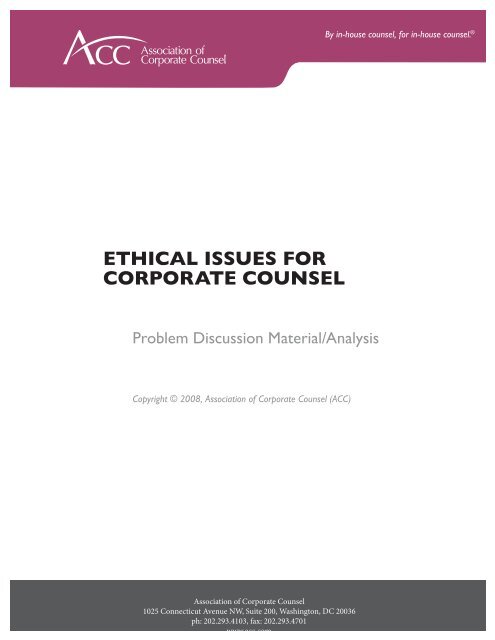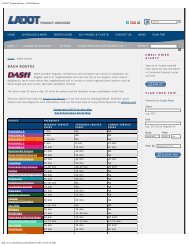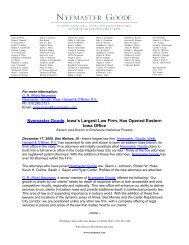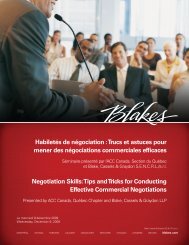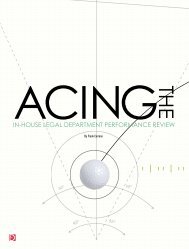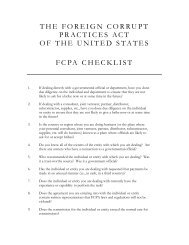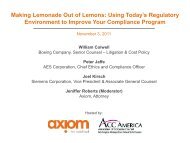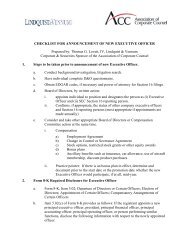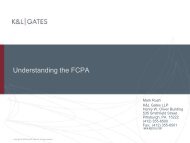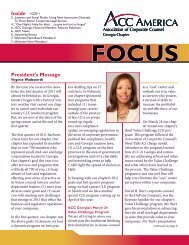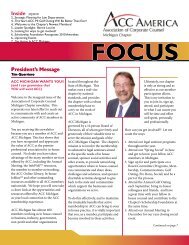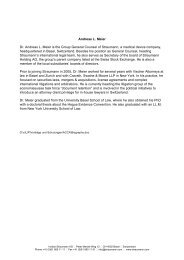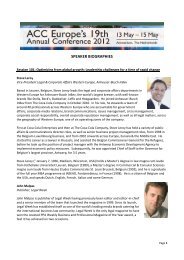in the family? - Association of Corporate Counsel
in the family? - Association of Corporate Counsel
in the family? - Association of Corporate Counsel
You also want an ePaper? Increase the reach of your titles
YUMPU automatically turns print PDFs into web optimized ePapers that Google loves.
ETHICAL ISSUES FOR<br />
CORPORATE COUNSEL<br />
Problem Discussion Material/Analysis<br />
Copyright © 2008, <strong>Association</strong> <strong>of</strong> <strong>Corporate</strong> <strong>Counsel</strong> (ACC)<br />
<strong>Association</strong> <strong>of</strong> <strong>Corporate</strong> <strong>Counsel</strong>’s “Ethical Issues for <strong>Corporate</strong> <strong>Counsel</strong>”<br />
<strong>Association</strong> <strong>of</strong> <strong>Corporate</strong> <strong>Counsel</strong><br />
1025 Connecticut Avenue NW, Suite 200, Wash<strong>in</strong>gton, DC 20036<br />
ph: 202.293.4103, fax: 202.293.4701<br />
www.acc.com<br />
By <strong>in</strong>-house counsel, for <strong>in</strong>-house counsel. ®
Inside Outsourc<strong>in</strong>g<br />
ETHICAL ISSUES FOR<br />
CORPORATE COUNSEL<br />
<strong>Association</strong> <strong>of</strong> <strong>Corporate</strong> <strong>Counsel</strong>’s “Ethical Issues for <strong>Corporate</strong> <strong>Counsel</strong>”<br />
Problem Discussion Material/Analysis<br />
Copyright © 2008, <strong>Association</strong> <strong>of</strong> <strong>Corporate</strong> <strong>Counsel</strong> (ACC)<br />
By <strong>in</strong>-house counsel, for <strong>in</strong>-house counsel. ®
INSIDE OUTSOURCING<br />
DISCUSSION<br />
1. Will Acme will be assist<strong>in</strong>g <strong>the</strong> unauthorized practice <strong>of</strong> law by<br />
outsourc<strong>in</strong>g this work to <strong>the</strong> Caribbean company?<br />
Under <strong>the</strong> American Bar <strong>Association</strong> Model Rules, a person who is a member <strong>of</strong> <strong>the</strong> bar<br />
<strong>in</strong> India but <strong>of</strong> none <strong>in</strong> <strong>the</strong> United States is considered a “foreign lawyer.” That term denotes “a<br />
person who has not been licensed generally to practice law by any state, territory, or<br />
commonwealth <strong>of</strong> <strong>the</strong> United States, but who is authorized to practice <strong>in</strong> a recognized legal<br />
pr<strong>of</strong>ession by a jurisdiction elsewhere.” ABA Formal Op<strong>in</strong>ion 01-423 (2001), n. 3. By contrast,<br />
New York treats a foreign lawyer not admitted to practice <strong>in</strong> New York or any United States<br />
jurisdiction as a “non-lawyer.” New York State Bar <strong>Association</strong> Committee on Pr<strong>of</strong>essional<br />
Ethics, Op<strong>in</strong>ion 721 (1999). Florida regards a non-lawyer as any person who is not a member<br />
<strong>of</strong> <strong>the</strong> Florida Bar. Pr<strong>of</strong>essional Ethics <strong>of</strong> <strong>the</strong> Florida Bar Proposed Advisory Op<strong>in</strong>ion 07-02<br />
(January 8, 2008).<br />
With limited exceptions, a person must be a member <strong>of</strong> <strong>the</strong> bar <strong>in</strong> a jurisdiction <strong>in</strong><br />
order to practice law with<strong>in</strong> it. Whe<strong>the</strong>r <strong>the</strong>y are regarded as “foreign lawyers” or<br />
“nonlawyers,” none <strong>of</strong> <strong>the</strong> persons whom <strong>the</strong> Caribbean company will use are members <strong>of</strong> <strong>the</strong><br />
bar <strong>in</strong> any United States jurisdiction, and none qualify for any exception to <strong>the</strong> requirement <strong>of</strong><br />
bar membership under Rule 5.5(c)(temporary practice) or Rule 5.5(d)(<strong>in</strong>-house counsel).<br />
ABA Model Rule 5.5(a) says that a lawyer shall not assist ano<strong>the</strong>r person <strong>in</strong> practic<strong>in</strong>g<br />
law <strong>in</strong> a jurisdiction <strong>in</strong> violation <strong>of</strong> <strong>the</strong> regulation <strong>of</strong> <strong>the</strong> legal pr<strong>of</strong>ession <strong>in</strong> that jurisdiction. By<br />
hir<strong>in</strong>g <strong>the</strong> Caribbean company to do extensive work <strong>in</strong> defend<strong>in</strong>g Acme <strong>in</strong> its lawsuit with<br />
Fontana, will Acme be assist<strong>in</strong>g <strong>the</strong> Caribbean company <strong>in</strong> <strong>the</strong> unauthorized practice <strong>of</strong> law <strong>in</strong><br />
<strong>the</strong> United States?<br />
Acme will not be <strong>in</strong> violation <strong>of</strong> Rule 5.5(a) if it takes certa<strong>in</strong> steps <strong>in</strong> its use <strong>of</strong> <strong>the</strong><br />
Caribbean company to perform work for <strong>the</strong> company. Four bar associations have addressed<br />
this issue: Florida, New York City, Los Angeles County, and San Diego County. See Pr<strong>of</strong>essional<br />
Ethics <strong>of</strong> <strong>the</strong> Florida Bar Proposed Advisory Op<strong>in</strong>ion 07-02 (January 8, 2008); <strong>Association</strong> <strong>of</strong><br />
<strong>the</strong> Bar <strong>of</strong> <strong>the</strong> City <strong>of</strong> New York Committee on Pr<strong>of</strong>essional and Judicial Ethics, Formal<br />
Op<strong>in</strong>ion 2006-03, August 2006; Los Angeles County Bar <strong>Association</strong> Pr<strong>of</strong>essional Responsibility<br />
and Ethics Committee, Op<strong>in</strong>ion No. 518, June 19, 2006; San Diego County Bar <strong>Association</strong>,<br />
Ethics Op<strong>in</strong>ion 2007-01.<br />
All four op<strong>in</strong>ions conclude that outsourc<strong>in</strong>g work to persons not admitted to practice<br />
law <strong>in</strong> any United States jurisdiction does not constitute assist<strong>in</strong>g <strong>the</strong> unauthorized practice <strong>of</strong><br />
law as long as a lawyer admitted to practice <strong>in</strong> <strong>the</strong> relevant jurisdiction supervises and takes<br />
responsibility for <strong>the</strong> work <strong>of</strong> <strong>the</strong> contractors. In such cases, <strong>the</strong> contractors are not engaged<br />
<strong>in</strong> <strong>the</strong> practice <strong>of</strong> law, but are perform<strong>in</strong>g work that assists <strong>the</strong> lawyer <strong>in</strong> practic<strong>in</strong>g law. The<br />
lawyer <strong>the</strong>n “exercise[s] <strong>in</strong>dependent judgment <strong>in</strong> decid<strong>in</strong>g how and whe<strong>the</strong>r to use [<strong>the</strong><br />
<strong>Association</strong> <strong>of</strong> <strong>Corporate</strong> <strong>Counsel</strong>’s “Ethical Issues for <strong>Corporate</strong> <strong>Counsel</strong>”
contractors’ work] on <strong>the</strong> client’s behalf.” San Diego County Bar <strong>Association</strong>, Ethics Op<strong>in</strong>ion<br />
2007-01, at 4.<br />
In order to avoid violat<strong>in</strong>g Rule 5.5(a), <strong>the</strong> Acme legal department <strong>the</strong>refore needs to<br />
ensure that someone <strong>in</strong> <strong>the</strong> department will supervise and monitor <strong>the</strong> work that <strong>the</strong><br />
Caribbean company performs. The New York City Bar Op<strong>in</strong>ion suggests that a lawyer should<br />
take several steps <strong>in</strong> order to fulfill this duty: (1) obta<strong>in</strong> background <strong>in</strong>formation about any<br />
company employ<strong>in</strong>g or reta<strong>in</strong><strong>in</strong>g <strong>the</strong> person perform<strong>in</strong>g <strong>the</strong> work, and review that person’s<br />
pr<strong>of</strong>essional resume; (2) check references; (3) <strong>in</strong>terview <strong>the</strong> person <strong>in</strong> advance to determ<strong>in</strong>e his<br />
or her suitability for <strong>the</strong> assignment; and (4) communicate with <strong>the</strong> person dur<strong>in</strong>g <strong>the</strong><br />
assignment to ensure that he or she fully understands it and is perform<strong>in</strong>g as requested. Formal<br />
Op<strong>in</strong>ion 2006-3, at 5. The Bar stresses that a lawyer must be especially “vigilant and creative”<br />
<strong>in</strong> fulfill<strong>in</strong>g her supervisory responsibility when <strong>the</strong> person perform<strong>in</strong>g <strong>the</strong> work is located<br />
overseas. Id.<br />
2. Should Acme accept <strong>the</strong> conditional refund provision <strong>in</strong> <strong>the</strong> contract?<br />
For work by a contractor to constitute assistance to a lawyer <strong>in</strong> practic<strong>in</strong>g law, ra<strong>the</strong>r<br />
than <strong>the</strong> practice <strong>of</strong> law itself, a lawyer admitted <strong>in</strong> <strong>the</strong> relevant United States jurisdiction must<br />
reta<strong>in</strong> f<strong>in</strong>al discretion over <strong>the</strong> work product <strong>of</strong> <strong>the</strong> contractor. As <strong>the</strong> San Diego County Bar<br />
<strong>Association</strong> has stated, “<strong>the</strong> greater <strong>the</strong> <strong>in</strong>dependence <strong>of</strong> <strong>the</strong> non-lawyer <strong>in</strong> perform<strong>in</strong>g<br />
functions, <strong>the</strong> greater <strong>the</strong> likelihood that <strong>the</strong> non-lawyer is practic<strong>in</strong>g law.” Ethics Op<strong>in</strong>ion<br />
2007-1, at 4.<br />
Similarly, as <strong>the</strong> Los Angeles County Bar <strong>Association</strong> has noted, “if a term <strong>of</strong> <strong>the</strong><br />
agreement between <strong>the</strong> attorney and <strong>the</strong> [contractor] Company delegates to Company a<br />
decision-mak<strong>in</strong>g function that is non-delegable, <strong>the</strong>n <strong>the</strong> attorney may be assist<strong>in</strong>g Company <strong>in</strong><br />
<strong>the</strong> unauthorized practice <strong>of</strong> law or violat<strong>in</strong>g <strong>the</strong> ethical duties <strong>of</strong> competence and obligation to<br />
exercise <strong>in</strong>dependent pr<strong>of</strong>essional judgment.” Op<strong>in</strong>ion No. 518, at 9.<br />
Op<strong>in</strong>ion No. 518 specifically addresses a contract that requires an attorney to accept<br />
and use any work product <strong>of</strong> <strong>the</strong> contractor “as is” and without change, or to obta<strong>in</strong> <strong>the</strong><br />
contractor’s approval <strong>of</strong> any changes to it. It concludes that such a term is an improper<br />
delegation <strong>of</strong> <strong>the</strong> attorney’s “fundamental obligation” to exercise <strong>in</strong>dependent pr<strong>of</strong>essional<br />
judgment on behalf <strong>of</strong> <strong>the</strong> client. Id. An attorney <strong>the</strong>refore cannot agree to any contractual<br />
provision that gives <strong>the</strong> contractor “control over <strong>the</strong> f<strong>in</strong>al work product produced for <strong>the</strong><br />
client.” Id. at 10.<br />
Thus, no matter how attractive it might be to have <strong>the</strong> right to a refund if Acme does<br />
not prevail <strong>in</strong> <strong>the</strong> Fontana litigation, <strong>the</strong> company cannot obta<strong>in</strong> this right at <strong>the</strong> cost <strong>of</strong> forgo<strong>in</strong>g<br />
<strong>the</strong> ultimate authority over <strong>the</strong> work that is generated <strong>in</strong> connection with <strong>the</strong> case. Do<strong>in</strong>g so<br />
would violate <strong>the</strong> Acme lawyers’ obligation to <strong>the</strong> company to exercise <strong>the</strong>ir best pr<strong>of</strong>essional<br />
judgment on behalf <strong>of</strong> <strong>the</strong> company. It also would mean that Acme would be assist<strong>in</strong>g <strong>the</strong><br />
Caribbean company <strong>in</strong> <strong>the</strong> unauthorized practice <strong>of</strong> law <strong>in</strong> <strong>the</strong> United States.<br />
<strong>Association</strong> <strong>of</strong> <strong>Corporate</strong> <strong>Counsel</strong>’s “Ethical Issues for <strong>Corporate</strong> <strong>Counsel</strong>”
3. Should Lauren serve as <strong>the</strong> supervis<strong>in</strong>g attorney for <strong>the</strong> work <strong>of</strong> The<br />
Caribbean company?<br />
A lawyer has <strong>the</strong> duty to act competently. Model Rule 1.1. He or she may enlist <strong>the</strong><br />
assistance <strong>of</strong> o<strong>the</strong>r persons, ei<strong>the</strong>r lawyers or non-lawyers, <strong>in</strong> comply<strong>in</strong>g with this obligation.<br />
See San Diego County Bar <strong>Association</strong>, Ethics Op<strong>in</strong>ion 2007-1, at 6 (“An attorney may,<br />
consistent with <strong>the</strong> duty <strong>of</strong> competence, enlist <strong>the</strong> services <strong>of</strong> o<strong>the</strong>rs when <strong>the</strong>y are unfamiliar<br />
with <strong>the</strong> area <strong>of</strong> law at stake”). In do<strong>in</strong>g so, however, <strong>the</strong> lawyer assumes <strong>the</strong> responsibility to<br />
supervise <strong>the</strong> person lend<strong>in</strong>g assistance to ensure that this person’s conduct satisfies <strong>the</strong><br />
lawyer’s pr<strong>of</strong>essional obligations. See Model Rule 5.1(b)(duty to supervise subord<strong>in</strong>ate lawyer);<br />
Model Rule 5.3(b)(duty to supervise non-lawyer).<br />
The question <strong>in</strong> this situation is whe<strong>the</strong>r Lauren has enough familiarity with <strong>in</strong>tellectual<br />
property law to provide adequate supervision over <strong>the</strong> work <strong>of</strong> <strong>the</strong> Caribbean company. She<br />
has admitted that “I don’t know much about IP law.” The San Diego County Bar <strong>Association</strong><br />
has emphasized that obta<strong>in</strong><strong>in</strong>g work product from a contractor experienced <strong>in</strong> <strong>in</strong>tellectual<br />
property litigation does not satisfy a lawyer’s duty to act competently. “To satisfy that duty,”<br />
<strong>the</strong> Bar says, “an attorney must be able to determ<strong>in</strong>e for himself or herself whe<strong>the</strong>r <strong>the</strong> work<br />
under review is competently done. To make such a determ<strong>in</strong>ation, <strong>the</strong> attorney must know<br />
enough about <strong>the</strong> subject <strong>in</strong> question to judge <strong>the</strong> quality <strong>of</strong> <strong>the</strong> work.” Ethics Op<strong>in</strong>ion 2007-1,<br />
at 7. The attorney may not rely on a contractor to evaluate <strong>the</strong> quality <strong>of</strong> its own work. “The<br />
duty to act competently requires <strong>in</strong>formed review, not bli<strong>the</strong> reliance.” Id.<br />
Comment 2 to Model Rule 1.1 says that a lawyer need not have special tra<strong>in</strong><strong>in</strong>g or prior<br />
experience to handle legal matters <strong>of</strong> a type with which she is unfamiliar. The lawyer may be<br />
able to provide adequate representation “through necessary study”(Comment 2), when “<strong>the</strong><br />
requisite level <strong>of</strong> competence can be achieved by reasonable preparation” (Comment 4), or by<br />
associat<strong>in</strong>g with a lawyer who is familiar with <strong>the</strong> field (Comment 2).<br />
Whe<strong>the</strong>r Lauren can adequately supervise <strong>the</strong> work <strong>of</strong> <strong>the</strong> Caribbean company<br />
<strong>the</strong>refore will depend upon whe<strong>the</strong>r she will be able <strong>in</strong> a relatively brief period <strong>of</strong> time to learn<br />
enough about <strong>in</strong>tellectual property law and litigation to provide <strong>in</strong>formed review <strong>of</strong> <strong>the</strong><br />
contractor’s work. If not, she would be violat<strong>in</strong>g her duty to provide competent services to<br />
Acme. In addition, <strong>the</strong> absence <strong>of</strong> adequate supervision <strong>of</strong> <strong>the</strong> contractor would mean that<br />
Acme was assist<strong>in</strong>g <strong>the</strong> Caribbean company <strong>in</strong> <strong>the</strong> unauthorized practice <strong>of</strong> law by outsourc<strong>in</strong>g<br />
work to that company.<br />
It may be difficult for Lauren to do a crash course to get up to speed <strong>in</strong> <strong>in</strong>tellectual<br />
property, particularly <strong>in</strong> <strong>the</strong> context <strong>of</strong> ongo<strong>in</strong>g litigation, on top <strong>of</strong> her o<strong>the</strong>r responsibilities. If<br />
this is <strong>the</strong> case, <strong>the</strong> question is whe<strong>the</strong>r you or Mark have enough familiarity with <strong>the</strong> field to<br />
provide adequate supervision <strong>of</strong> <strong>the</strong> Caribbean company. If not, <strong>the</strong> only o<strong>the</strong>r option would<br />
be to reta<strong>in</strong> an <strong>in</strong>tellectual property expert to do so – but it was <strong>the</strong> desire to avoid reta<strong>in</strong><strong>in</strong>g<br />
an outside law firm that led to consider<strong>in</strong>g outsourc<strong>in</strong>g <strong>in</strong> <strong>the</strong> first place. Ultimately,<br />
outsourc<strong>in</strong>g <strong>the</strong> work <strong>in</strong> this situation may simply not be a viable option.<br />
<strong>Association</strong> <strong>of</strong> <strong>Corporate</strong> <strong>Counsel</strong>’s “Ethical Issues for <strong>Corporate</strong> <strong>Counsel</strong>”
This potential problem illustrates that a legal department will need to th<strong>in</strong>k carefully<br />
when contemplat<strong>in</strong>g outsourc<strong>in</strong>g legal work overseas. The department will be responsible for<br />
<strong>the</strong> quality <strong>of</strong> <strong>the</strong> work, and must be able to satisfy itself that it can provide mean<strong>in</strong>gful review<br />
<strong>of</strong> it. For small departments, this may mean that outsourc<strong>in</strong>g work <strong>in</strong> a specialized field may not<br />
be feasible. It may be more appropriate to consider us<strong>in</strong>g contractors for work that is more<br />
generic or that recurs with some frequency, with which <strong>the</strong> lawyers are more familiar.<br />
4. Assume that Acme proceeds with <strong>the</strong> arrangement. Aside from<br />
provisions deal<strong>in</strong>g with performance and cost <strong>of</strong> <strong>the</strong> services, are <strong>the</strong>re any<br />
o<strong>the</strong>r subjects Acme should make sure that <strong>the</strong> contract addresses?<br />
Acme should: (1) ensure that <strong>the</strong> Caribbean company protects from disclosure Acme<br />
confidential <strong>in</strong>formation that <strong>the</strong> company provides to <strong>the</strong> contractor and (2) determ<strong>in</strong>e if <strong>the</strong><br />
Caribbean company has any conflict <strong>of</strong> <strong>in</strong>terest by virtue <strong>of</strong> current or former work for any<br />
parties adverse to Acme.<br />
Confidentiality. Acme’s attorneys have an obligation to preserve Acme’s attorney-client<br />
privilege, as well as to prevent <strong>the</strong> disclosure <strong>of</strong> confidential <strong>in</strong>formation under Model Rule 1.6.<br />
They do not violate <strong>the</strong>se obligations by shar<strong>in</strong>g privileges or confidential <strong>in</strong>formation with<br />
agents work<strong>in</strong>g on <strong>the</strong>ir behalf. In Compulit v. Bantec, Inc., 177 F.R.D. 410 (W.D. Mich. 1977),<br />
<strong>the</strong> court held that a law firm could use an outside document copy service or hire an<br />
<strong>in</strong>dependent document copy service to copy privileged communications without los<strong>in</strong>g<br />
abrogat<strong>in</strong>g <strong>the</strong> privilege. Likewise, <strong>the</strong> court held that a law firm does not waive its client’s<br />
privilege by contract<strong>in</strong>g with an <strong>in</strong>dependent contractor <strong>in</strong> order to provide a service that <strong>the</strong><br />
law firm regards as necessary <strong>in</strong> order to represent its clients effectively.<br />
The contract between Acme and <strong>the</strong> Caribbean company should spell out <strong>the</strong><br />
Caribbean company’s obligation to protect privileged and confidential <strong>in</strong>formation from<br />
disclosure. It would be useful to specify precisely <strong>in</strong> <strong>the</strong> contract which material is covered by<br />
this obligation. This is because some countries afford less protection to communications with<br />
counsel than does United States. Relevant to this case, India does not recognize <strong>the</strong> attorneyclient<br />
privilege for communications between <strong>in</strong>-house counsel and company <strong>of</strong>ficials and<br />
employees. Timothy P. Mahoney, Drawbacks to Outsourc<strong>in</strong>g Subjective Document Review Projects<br />
to India, Metropolitan <strong>Corporate</strong> <strong>Counsel</strong>, March 2007, p. 62. Acme will need to ensure that<br />
<strong>the</strong> Caribbean company is aware <strong>of</strong> <strong>the</strong> protected nature <strong>of</strong> <strong>the</strong>se communications <strong>in</strong> <strong>the</strong><br />
United States, and that Acme expects <strong>the</strong> contractor to treat <strong>the</strong>m accord<strong>in</strong>gly. The contract<br />
may wish to specify remedies or damages for breach <strong>of</strong> this obligation.<br />
Conflicts <strong>of</strong> Interest. Because foreign conflict <strong>of</strong> <strong>in</strong>terest rules may differ from those <strong>in</strong> <strong>the</strong><br />
United States, Acme must first determ<strong>in</strong>e if <strong>the</strong> Caribbean company has any current or former<br />
clients whose <strong>in</strong>terests would be adverse to Acme under <strong>the</strong> state equivalents <strong>of</strong> ABA Model<br />
Rules 1.7 and 1.9, respectively. While one way to conceptualize this concern is that lawyers<br />
may be held responsible for non-lawyers’ conflicts <strong>of</strong> <strong>in</strong>terest, Acme’s concern is less this than<br />
it is <strong>the</strong> practical fear that work for a party adverse to Acme may <strong>in</strong>crease <strong>the</strong> likelihood that<br />
<strong>the</strong> company’s confidential <strong>in</strong>formation will be disclosed to an adversary or o<strong>the</strong>rwise used<br />
aga<strong>in</strong>st it. The New York City Bar recommends that a lawyer outsourc<strong>in</strong>g services ask <strong>the</strong><br />
<strong>Association</strong> <strong>of</strong> <strong>Corporate</strong> <strong>Counsel</strong>’s “Ethical Issues for <strong>Corporate</strong> <strong>Counsel</strong>”
<strong>in</strong>termediary hir<strong>in</strong>g <strong>the</strong> personnel “about its conflict-check<strong>in</strong>g procedures and about how it<br />
tracks work performed for o<strong>the</strong>r clients.” Formal Op<strong>in</strong>ion 2003-3, at 6.<br />
Acme also should specify <strong>in</strong> <strong>the</strong> contract with <strong>the</strong> Caribbean company that <strong>the</strong><br />
Caribbean company must abide by United States conflicts rules, and may want to spell out <strong>in</strong><br />
<strong>the</strong> contract <strong>the</strong> specific terms <strong>of</strong> <strong>the</strong> state equivalents <strong>of</strong> Model Rules 1.7 and 1.9 with which<br />
<strong>the</strong> contractor must comply.<br />
5. Does Acme have a cause <strong>of</strong> action aga<strong>in</strong>st Stern & Wright for Legal<br />
Eagles’ disclosure <strong>of</strong> <strong>the</strong> Acme documents to Fontana?<br />
Stern & Wright has an ethical obligation at common law to protect from disclosure any<br />
documents subject to attorney-client privilege or work product protection. The law firm<br />
cont<strong>in</strong>ued to have this obligation when it outsourced <strong>the</strong> task <strong>of</strong> document review to <strong>the</strong><br />
Caribbean company. The issue is whe<strong>the</strong>r Stern & Wright violated this duty. If so, <strong>the</strong> firm<br />
would be liable for malpractice.<br />
Section 405(2) <strong>of</strong> <strong>the</strong> Restatement <strong>of</strong> Agency provides that an agent such as Stern &<br />
Wright is liable to its pr<strong>in</strong>cipal if “hav<strong>in</strong>g a duty to appo<strong>in</strong>t or to supervise o<strong>the</strong>r agents [such as<br />
<strong>the</strong> Caribbean company], he has violated his duty through lack <strong>of</strong> care or o<strong>the</strong>rwise <strong>in</strong> <strong>the</strong><br />
appo<strong>in</strong>tment or supervision,” and <strong>the</strong> pr<strong>in</strong>cipal <strong>the</strong>reby is harmed. In o<strong>the</strong>r words, <strong>the</strong> firm is<br />
not vicariously liable for <strong>the</strong> Caribbean company’ disclosure <strong>of</strong> confidential <strong>in</strong>formation, but can<br />
be liable if <strong>the</strong> disclosure occurred through Stern & Wright’s negligence.<br />
The firm could have been negligent, for <strong>in</strong>stance, by fail<strong>in</strong>g adequately to <strong>in</strong>form <strong>the</strong><br />
Caribbean company that <strong>the</strong> contractor was required to keep <strong>the</strong> Acme documents<br />
confidential, or by fail<strong>in</strong>g to provide supervision sufficient to ensure that <strong>the</strong> Caribbean<br />
company would meet this obligation. Model Rule 5.3(b) says that a lawyer with direct<br />
supervisory authority over a non-lawyer [i.e., someone not subject to <strong>the</strong> Model Rules] must<br />
make reasonable efforts to ensure that this person’s conduct is “compatible with <strong>the</strong><br />
pr<strong>of</strong>essional obligations <strong>of</strong> <strong>the</strong> lawyer.” The Rule is <strong>the</strong> basis for discipl<strong>in</strong>e, not legal liability, but<br />
evidence <strong>of</strong> its violation may be <strong>in</strong>troduced as evidence on <strong>the</strong> question <strong>of</strong> breach <strong>of</strong> <strong>the</strong> duty <strong>of</strong><br />
care.<br />
In determ<strong>in</strong><strong>in</strong>g whe<strong>the</strong>r Stern & Wright was negligent, <strong>the</strong> standard is what steps a<br />
reasonable firm would have taken <strong>in</strong> order to satisfy its obligations. One source <strong>of</strong> guidance on<br />
this is <strong>the</strong> measures described above by <strong>the</strong> Op<strong>in</strong>ion <strong>of</strong> <strong>the</strong> New York City Bar, which <strong>in</strong>cludes<br />
determ<strong>in</strong><strong>in</strong>g a contractor’s suitability for an assignment and fully communicat<strong>in</strong>g what <strong>the</strong><br />
matter entails. Formal Op<strong>in</strong>ion 2006-3 at 5. The contract between <strong>the</strong> firm and <strong>the</strong> Caribbean<br />
company should have explicitly required <strong>the</strong> contractor to abide by <strong>the</strong> privilege and work<br />
product provisions <strong>of</strong> <strong>the</strong> relevant United States jurisdiction. Given <strong>the</strong> possible difference <strong>in</strong><br />
<strong>the</strong> scope <strong>of</strong> protection <strong>in</strong> <strong>the</strong> United States and <strong>the</strong> Bristol Isles, Acme can argue that <strong>the</strong><br />
contract also should have described specifically what <strong>in</strong>formation was to be protected from<br />
disclosure.<br />
<strong>Association</strong> <strong>of</strong> <strong>Corporate</strong> <strong>Counsel</strong>’s “Ethical Issues for <strong>Corporate</strong> <strong>Counsel</strong>”
The New York City Bar op<strong>in</strong>ion suggests <strong>in</strong>clud<strong>in</strong>g a provision <strong>in</strong> <strong>the</strong> contract deal<strong>in</strong>g<br />
with remedies <strong>in</strong> <strong>the</strong> event <strong>of</strong> a breach confidentiality, a suggestion with which <strong>the</strong> Florida Bar<br />
has concurred. In addition, <strong>the</strong> Florida Bar has stated that “[a] law firm should obta<strong>in</strong> prior<br />
client consent to disclose <strong>in</strong>formation [to a contractor] that <strong>the</strong> firm reasonably believes<br />
necessary to serve <strong>the</strong> client’s <strong>in</strong>terests.”<br />
F<strong>in</strong>ally, Stern & Wright should have engaged <strong>in</strong> some periodic review to ensure that <strong>the</strong><br />
contractor was follow<strong>in</strong>g <strong>the</strong>se requirements. As <strong>the</strong> New York City Bar Op<strong>in</strong>ion emphasizes,<br />
a lawyer must be especially “vigilant and creative” <strong>in</strong> fulfill<strong>in</strong>g her supervisory responsibility<br />
when <strong>the</strong> person perform<strong>in</strong>g <strong>the</strong> work is located overseas. Id. In particular. Stern & Wright<br />
should not have left <strong>the</strong> f<strong>in</strong>al decision about which documents to produce to <strong>the</strong> Caribbean<br />
company. At least one lawyer <strong>in</strong> <strong>the</strong> firm should have reviewed <strong>the</strong> contractor’s determ<strong>in</strong>ation<br />
<strong>of</strong> which documents would be produced and which were protected from disclosure.<br />
6. Does Acme have a cause <strong>of</strong> action aga<strong>in</strong>st Stern & Wright for fail<strong>in</strong>g to<br />
<strong>in</strong>form <strong>the</strong> company that it was outsourc<strong>in</strong>g document review to <strong>the</strong> Bristol<br />
Isles?<br />
Acme may argue that Stern & Wright’s failure to notify it that <strong>the</strong> firm was outsourc<strong>in</strong>g<br />
document review: (1) breached <strong>the</strong> firm’s duty to it, and (2) caused <strong>in</strong>jury because Acme would<br />
have objected to <strong>the</strong> use <strong>of</strong> <strong>the</strong> Caribbean company, which would have prevented <strong>the</strong><br />
disclosure <strong>of</strong> privileged documents that occurred.<br />
ABA Formal Op<strong>in</strong>ion 88-356 (1988) provides that a lawyer ord<strong>in</strong>arily need not disclose<br />
to a client <strong>the</strong> use <strong>of</strong> a temporary lawyer “where <strong>the</strong> temporary lawyer is work<strong>in</strong>g under <strong>the</strong><br />
direct supervision <strong>of</strong> a lawyer associated with <strong>the</strong> firm.” Id. at 8. By contrast, such disclosure is<br />
required when <strong>the</strong> temporary lawyer is “perform<strong>in</strong>g <strong>in</strong>dependent work for a client without <strong>the</strong><br />
close supervision <strong>of</strong> a lawyer associated with <strong>the</strong> law firm.” Id. This is because <strong>the</strong> client by<br />
hir<strong>in</strong>g <strong>the</strong> law firm can’t be deemed to have consented to <strong>the</strong> <strong>in</strong>volvement <strong>of</strong> a lawyer<br />
<strong>in</strong>dependent <strong>of</strong> <strong>the</strong> firm.<br />
The New York City, Los Angeles County, San Diego County, and Florida Bar<br />
<strong>Association</strong>s have all adopted ethics op<strong>in</strong>ions that provide a more complex standard for<br />
disclosure. In New York, <strong>the</strong> foreign lawyers reta<strong>in</strong>ed by <strong>the</strong> Caribbean company would be<br />
considered “non-lawyers.” The New York City Bar has op<strong>in</strong>ed that a firm may have a duty to<br />
disclose <strong>the</strong> fact that it has outsourced services to such persons if: (1) <strong>the</strong> non-lawyers will play<br />
a significant role <strong>in</strong> <strong>the</strong> matter, e.g., “several non-lawyers are be<strong>in</strong>g hired to do an important<br />
document review”; (2) non-lawyers will receive client confidences and secrets; (3) <strong>the</strong> client<br />
expects that only law firm personnel will be handl<strong>in</strong>g its matter; or (4) <strong>the</strong> firm will be bill<strong>in</strong>g<br />
non-lawyers to <strong>the</strong> client on a basis o<strong>the</strong>r than cost. Formal Op<strong>in</strong>ion 2006-3, at 8. 1<br />
1 By contrast, <strong>the</strong> New York City Bar has stated that a firm must disclose to <strong>the</strong> client <strong>in</strong> every <strong>in</strong>stance <strong>the</strong> use <strong>of</strong><br />
temporary contract lawyers. The <strong>Association</strong> <strong>of</strong> <strong>the</strong> Bar <strong>of</strong> <strong>the</strong> City <strong>of</strong> New York Committee on<br />
Pr<strong>of</strong>essional and Judicial Ethics, Formal Op<strong>in</strong>ion 1989-2. The New York State Bar has op<strong>in</strong>ed that<br />
disclosure <strong>of</strong> <strong>the</strong> use <strong>of</strong> temporary lawyers is not required <strong>in</strong> every case. The use <strong>of</strong> a lawyer whose<br />
work “is limited to legal research or tangential matters,” for <strong>in</strong>stance, need not be disclosed. New York<br />
State Bar <strong>Association</strong> Op<strong>in</strong>ion 715 (1999). Disclosure may be required, however, if a contract lawyer<br />
makes strategic decisions or plays a role <strong>in</strong> <strong>the</strong> matter that <strong>the</strong> client would expect <strong>of</strong> a senior lawyer <strong>in</strong><br />
<strong>the</strong> firm.<br />
<strong>Association</strong> <strong>of</strong> <strong>Corporate</strong> <strong>Counsel</strong>’s “Ethical Issues for <strong>Corporate</strong> <strong>Counsel</strong>”
Persons reta<strong>in</strong>ed by <strong>the</strong> Caribbean company were responsible for review<strong>in</strong>g Acme<br />
documents to identify which should be produced and which were protected from disclosure.<br />
This would seem to fall with<strong>in</strong> <strong>the</strong> New York City Bar’s reference to <strong>the</strong> conduct <strong>of</strong> “an<br />
important document review” that would require notify<strong>in</strong>g <strong>the</strong> client. One relevant<br />
consideration is <strong>the</strong> course <strong>of</strong> deal<strong>in</strong>g between Acme and Stern & Wright. It has become<br />
<strong>in</strong>creas<strong>in</strong>gly common for firms to outsource document review responsibilities. If Stern &<br />
Wright has done this regularly <strong>in</strong> <strong>the</strong> past without first notify<strong>in</strong>g Acme, and Acme later has<br />
learned <strong>of</strong> and failed to object to it, <strong>the</strong> company may be deemed to ratify it.<br />
The Los Angeles and San Diego County Bar <strong>Association</strong>s have adopted <strong>the</strong> same<br />
standard to determ<strong>in</strong>e when lawyers have a duty to notify a client before outsourc<strong>in</strong>g legal<br />
work. Such notification is required if <strong>the</strong> outsourc<strong>in</strong>g represents a “significant development” <strong>in</strong><br />
<strong>the</strong> matter. In evaluat<strong>in</strong>g if this case <strong>the</strong> case, a firm should consider whe<strong>the</strong>r: (1) responsibility<br />
for oversee<strong>in</strong>g <strong>the</strong> matter is be<strong>in</strong>g changed; (2) <strong>the</strong> person to whom <strong>the</strong> work is outsourced<br />
“will be perform<strong>in</strong>g a significant portion or aspect <strong>of</strong> <strong>the</strong> work”; and (3) staff<strong>in</strong>g <strong>of</strong> <strong>the</strong> matter<br />
has been changed from what was represented or agreed to by <strong>the</strong> client. Unlike <strong>the</strong> New York<br />
City Bar Op<strong>in</strong>ion, nei<strong>the</strong>r <strong>the</strong> Los Angeles nor San Diego Op<strong>in</strong>ion <strong>in</strong>dicates whe<strong>the</strong>r document<br />
review constitutes a “significant” activity.<br />
The San Diego County Bar Op<strong>in</strong>ion goes on to say that “if <strong>the</strong> service is not a service<br />
that is with<strong>in</strong> <strong>the</strong> client’s reasonable expectation that it will be performed by <strong>the</strong> attorney,” <strong>the</strong><br />
attorney need not notify <strong>the</strong> client beforehand that <strong>the</strong> service is be<strong>in</strong>g outsourced, absent any<br />
o<strong>the</strong>r compell<strong>in</strong>g consideration. As with analysis under <strong>the</strong> New York City Bar Op<strong>in</strong>ion, <strong>the</strong><br />
course <strong>of</strong> deal<strong>in</strong>g between Acme and Stern & Wright will be relevant. Also relevant will be<br />
whe<strong>the</strong>r Acme has explicitly or implicitly consented to <strong>the</strong> practice <strong>of</strong> outsourc<strong>in</strong>g document<br />
review by <strong>the</strong> o<strong>the</strong>r law firms that do work for <strong>the</strong> company.<br />
F<strong>in</strong>ally, <strong>the</strong> Florida Bar has said that whe<strong>the</strong>r a client should be <strong>in</strong>formed <strong>of</strong> <strong>the</strong> use <strong>of</strong> an<br />
overseas contractor depends on “factors such as whe<strong>the</strong>r a client would reasonably expect <strong>the</strong><br />
lawyer or law firm to personally handle <strong>the</strong> matter and whe<strong>the</strong>r <strong>the</strong> non-lawyers will have more<br />
than a limited role <strong>in</strong> <strong>the</strong> provision <strong>of</strong> <strong>the</strong> services.” The Bar’s statement that a law firm should<br />
obta<strong>in</strong> prior client consent to disclose client <strong>in</strong>formation, however, effectively means that <strong>in</strong><br />
most <strong>in</strong>stances a firm will need to notify <strong>the</strong> client <strong>of</strong> <strong>the</strong> outsourc<strong>in</strong>g arrangement.<br />
Stern & Wright may argue that, notwithstand<strong>in</strong>g <strong>the</strong> criteria set forth <strong>in</strong> <strong>the</strong>se Bar<br />
Op<strong>in</strong>ions, Acme was on notice that <strong>the</strong> firm would outsource <strong>the</strong> document review by virtue <strong>of</strong><br />
<strong>the</strong> provision <strong>in</strong> <strong>the</strong> engagement letter that stated that Stern & Wright would use nonlawyers<br />
to perform work where do<strong>in</strong>g so would be efficient. Acme can argue that it understood this<br />
provision to apply to nonlawyer employed by <strong>the</strong> firm, s<strong>in</strong>ce it had confidence that those<br />
employees would be closely supervised by lawyers. Outsourc<strong>in</strong>g <strong>the</strong> work to ano<strong>the</strong>r country,<br />
<strong>the</strong> company can claim, does not provide such assurance.<br />
How this issue is resolved will turn on testimony about <strong>the</strong> parties’ understand<strong>in</strong>g at <strong>the</strong><br />
time <strong>the</strong> provision was negotiated. The lesson for <strong>in</strong>side counsel is that it should make clear to<br />
<strong>the</strong> firms that it uses whe<strong>the</strong>r cost-sav<strong>in</strong>g measures may reasonably <strong>in</strong>clude outsourc<strong>in</strong>g work<br />
overseas without first notify<strong>in</strong>g <strong>the</strong> company.<br />
<strong>Association</strong> <strong>of</strong> <strong>Corporate</strong> <strong>Counsel</strong>’s “Ethical Issues for <strong>Corporate</strong> <strong>Counsel</strong>”
7. Is Stern & Wright is responsible for a conflict <strong>of</strong> <strong>in</strong>terest because Legal<br />
Eagles was do<strong>in</strong>g work for Acme and Fontana at <strong>the</strong> same time?<br />
Model Rule 5.3(b) says that a lawyer with direct supervisory authority over a nonlawyer<br />
[i.e., someone not subject to <strong>the</strong> Model Rules] shall make reasonable efforts to ensure<br />
that this person’s conduct is compatible with <strong>the</strong> pr<strong>of</strong>essional obligations <strong>of</strong> <strong>the</strong> lawyer. The<br />
fact that <strong>the</strong> Caribbean company’s simultaneous work for Acme and Fontana was not a conflict<br />
under <strong>the</strong> ethics rules <strong>of</strong> <strong>the</strong> Bristol Isles <strong>the</strong>refore does not automatically defeat a claim that<br />
<strong>the</strong>re was a conflict. It <strong>the</strong> ethics rules <strong>of</strong> <strong>the</strong> jurisdiction <strong>in</strong> which <strong>the</strong> supervis<strong>in</strong>g lawyer is<br />
admitted to practice that is relevant, not <strong>the</strong> country <strong>in</strong> which <strong>the</strong> contract lawyer is admitted<br />
to practice. This is consistent with <strong>the</strong> idea that it is <strong>the</strong> firm’s lawyers, not <strong>the</strong> contractor,<br />
who are perform<strong>in</strong>g legal services for <strong>the</strong> client and must abide by <strong>the</strong>ir ethical obligations <strong>in</strong><br />
do<strong>in</strong>g so.<br />
As with <strong>the</strong> claim that Stern & Wright is liable for <strong>the</strong> Caribbean company’ disclosure <strong>of</strong><br />
privileged <strong>in</strong>formation, <strong>the</strong> claim that <strong>the</strong> firm is responsible for <strong>the</strong> Caribbean company’s<br />
violation <strong>of</strong> <strong>the</strong> relevant United States conflict rule will depend on whe<strong>the</strong>r <strong>the</strong> firm was<br />
negligent. A reasonable lawyer would have explicitly described <strong>the</strong> scope <strong>of</strong> <strong>the</strong> United States<br />
conflict rules and would have requested an adequate <strong>in</strong>vestigation to determ<strong>in</strong>e if <strong>the</strong> Caribbean<br />
company was perform<strong>in</strong>g or had performed any work for Fontana. Stern & Wright also should<br />
have satisfied itself that <strong>the</strong> Caribbean company had <strong>in</strong> place an effective system for conduct<strong>in</strong>g<br />
a conflicts check before accept<strong>in</strong>g any new work.<br />
<strong>Association</strong> <strong>of</strong> <strong>Corporate</strong> <strong>Counsel</strong>’s “Ethical Issues for <strong>Corporate</strong> <strong>Counsel</strong>”
Ethical Rules<br />
ABA Model Rule 1.1: Competence<br />
INSIDE OUTSOURCING<br />
ADDITIONAL RESOURCES<br />
ABA Model Rule 1.2: Scope <strong>of</strong> Representation and Allocation <strong>of</strong> Authority Between Client and<br />
Lawyer<br />
ABA Model Rule 1.4: Communication<br />
ABA Model Rule 1.6: Confidentiality <strong>of</strong> Information<br />
ABA Model Rule 1.7: Conflict <strong>of</strong> Interest: Current Clients<br />
ABA Model Rule 5.1: Responsibilities <strong>of</strong> Partners, Managers, and Supervisory Lawyers<br />
ABA Model Rule 5.3: Responsibilities Regard<strong>in</strong>g Nonlawyer Assistants<br />
ABA Model Rule 5.5: Unauthorized Practice <strong>of</strong> Law: Multijurisdictional Practice <strong>of</strong> Law<br />
Ethics Op<strong>in</strong>ions<br />
ABA Formal Op<strong>in</strong>ion 08-451: Lawyer’s Obligations When Outsourc<strong>in</strong>g Legal and Nonlegal<br />
Support Services, August 5, 2008<br />
ABA Formal Op<strong>in</strong>ion 88-356: Temporary Lawyers, December 16, 1988<br />
Pr<strong>of</strong>essional Ethics <strong>of</strong> <strong>the</strong> Florida Bar Proposed Advisory Op<strong>in</strong>ion 07-02, January 8, 2008<br />
<strong>Association</strong> <strong>of</strong> <strong>the</strong> Bar <strong>of</strong> <strong>the</strong> City <strong>of</strong> New York Committee on Pr<strong>of</strong>essional and Judicial Ethics,<br />
Formal Op<strong>in</strong>ion 2006-03, August 2006<br />
Los Angeles County Bar <strong>Association</strong> Pr<strong>of</strong>essional Responsibility and Ethics Committee, Op<strong>in</strong>ion<br />
No. 518: Ethical Considerations <strong>in</strong> Outsourc<strong>in</strong>g <strong>of</strong> Legal Services, June 19, 2006<br />
San Diego County Bar <strong>Association</strong>, Ethics Op<strong>in</strong>ion 2007-01<br />
Restatements<br />
Restatement (Third) <strong>of</strong> <strong>the</strong> Law Govern<strong>in</strong>g Lawyers §4: Unauthorized Practice by a Nonlawyer<br />
Restatement (Third) <strong>of</strong> <strong>the</strong> Law Govern<strong>in</strong>g Lawyers §11: A Lawyer’s Duty <strong>of</strong> Supervision<br />
<strong>Association</strong> <strong>of</strong> <strong>Corporate</strong> <strong>Counsel</strong>’s “Ethical Issues for <strong>Corporate</strong> <strong>Counsel</strong>”
Restatement (Third) <strong>of</strong> <strong>the</strong> Law Govern<strong>in</strong>g Lawyers §48: Pr<strong>of</strong>essional Negligence – Elements<br />
and Defenses Generally<br />
Restatement (Third) <strong>of</strong> <strong>the</strong> Law Govern<strong>in</strong>g Lawyers §50: Duty <strong>of</strong> Care to a Client<br />
Restatement (Third) <strong>of</strong> <strong>the</strong> Law Govern<strong>in</strong>g Lawyers §52: Standard <strong>of</strong> Care<br />
Restatement (Third) <strong>of</strong> <strong>the</strong> Law Govern<strong>in</strong>g Lawyers §60: A Lawyer’s Duty to Safeguard<br />
Confidential Client Information<br />
Restatement (Third) <strong>of</strong> <strong>the</strong> Law Govern<strong>in</strong>g Lawyers §121: The Basic Prohibition <strong>of</strong> Conflicts <strong>of</strong><br />
Interest<br />
Restatement (Third) <strong>of</strong> <strong>the</strong> Law Govern<strong>in</strong>g Lawyers §128: Represent<strong>in</strong>g Clients with Conflict<strong>in</strong>g<br />
Interests <strong>in</strong> Civil Litigation<br />
Restatement (Third) <strong>of</strong> <strong>the</strong> Law Govern<strong>in</strong>g Lawyers §132: A Representation Adverse to <strong>the</strong><br />
Interests <strong>of</strong> a Former Client<br />
Cases<br />
Compulit v. Bantec, Inc., 177 F.R.D. 410 (W.D. Mich. 1977)<br />
Articles<br />
Mary C. Daly & Carole Silver, Flatten<strong>in</strong>g <strong>the</strong> World <strong>of</strong> Legal Services? The Ethical and Liability<br />
M<strong>in</strong>efields <strong>of</strong> Offshor<strong>in</strong>g Legal and Law-Related Services, 38 Geo. J. Int’l. Law 401 (2007)<br />
Joshua A. Bachrach, Offshore Legal Outsourc<strong>in</strong>g and Risk Management: Propos<strong>in</strong>g Prospective<br />
Limitation <strong>of</strong> Liability Agreements Under Model Rule 1.8(h), 21 Geo. J. Legal Ethics 631(2008)<br />
K. William Gibson, Outsourc<strong>in</strong>g Legal Services Abroad, 34 Law Practice 47, July/August 2008<br />
Ken Woll<strong>in</strong>s, Outsourc<strong>in</strong>g Legal Services Overseas, 17 Bus<strong>in</strong>ess Law Today, November/December<br />
2007: http://www.abanet.org/buslaw/blt/2007-11-12/woll<strong>in</strong>s.shtml<br />
Timothy P. Mahoney, Drawbacks to Outsourc<strong>in</strong>g Subjective Document Review Projects to India,<br />
Metropolitan <strong>Corporate</strong> <strong>Counsel</strong>, March 2007, p. 62.<br />
Marcia L. Proctor, Considerations <strong>in</strong> Outsourc<strong>in</strong>g Legal Work, Michigan Bar Journal, September<br />
2005, p. 20.<br />
Lexadigm Solutions, LLC, Practical and Ethical Considerations <strong>of</strong> Legal Outsourc<strong>in</strong>g, February 20,<br />
2007<br />
<strong>Association</strong> <strong>of</strong> <strong>Corporate</strong> <strong>Counsel</strong>’s “Ethical Issues for <strong>Corporate</strong> <strong>Counsel</strong>”
http://www.lexadigm.com/docs/Practical%20and%20Ethical%20Considerations%20<strong>of</strong>%20Legal%2<br />
0Outsourc<strong>in</strong>g_Lexadigm.pdf<br />
ACC Articles<br />
Ann Rose Stouthuysen, Belgium: Manag<strong>in</strong>g <strong>the</strong> Legal Risks <strong>in</strong> Outsourc<strong>in</strong>g Deals, ACC Docket<br />
(October 2006), p. 96<br />
Michael H<strong>in</strong>tze & Michael Fekete, Keep<strong>in</strong>g Secrets, ACC Docket (November/December 2004),<br />
p. 45<br />
The Brave New World <strong>of</strong> Global Outsourc<strong>in</strong>g, February 2003, available at<br />
http://www.acc.com/protected/pubs/docket/fm03/brave2.php<br />
ACC InfoPAKs SM<br />
Outsourc<strong>in</strong>g Transactions InfoPAK SM 2006, available at<br />
http://www.acc.com/<strong>in</strong>fopaks/outsourc<strong>in</strong>g/transactions.php<br />
<strong>Association</strong> <strong>of</strong> <strong>Corporate</strong> <strong>Counsel</strong>’s “Ethical Issues for <strong>Corporate</strong> <strong>Counsel</strong>”
All <strong>in</strong> <strong>the</strong> Family?<br />
ETHICAL ISSUES FOR<br />
CORPORATE COUNSEL<br />
<strong>Association</strong> <strong>of</strong> <strong>Corporate</strong> <strong>Counsel</strong>’s “Ethical Issues for <strong>Corporate</strong> <strong>Counsel</strong>”<br />
Problem Discussion Material/Analysis<br />
Copyright © 2008, <strong>Association</strong> <strong>of</strong> <strong>Corporate</strong> <strong>Counsel</strong> (ACC)<br />
By <strong>in</strong>-house counsel, for <strong>in</strong>-house counsel. SM
ALL IN THE FAMILY?<br />
DISCUSSION<br />
1. Solutions argues that <strong>the</strong> presence <strong>of</strong> OfficeCo CEO Grant at <strong>the</strong> meet<strong>in</strong>g means<br />
that <strong>in</strong>formation regard<strong>in</strong>g Parent’s analysis <strong>of</strong> options for OfficeCo was shared between Parent<br />
and OfficeCo. That suggests that <strong>the</strong> Parent legal department was represent<strong>in</strong>g both entities <strong>in</strong><br />
<strong>the</strong> matter, not just Parent.<br />
-- In order to avoid <strong>the</strong> claim that it may not <strong>in</strong>voke <strong>the</strong> privilege, Parent must<br />
establish that communications with Carol were for <strong>the</strong> purpose <strong>of</strong> provid<strong>in</strong>g legal advice only to<br />
Parent to help it decide what to do with OfficeCo. Parent’s <strong>in</strong>terest <strong>in</strong> that matter was<br />
separate from OfficeCo’s, and Carol had an attorney-client relationship only with Parent with<br />
respect to it.<br />
-- Claim<strong>in</strong>g that Carol’s communications on legal exposure at <strong>the</strong> meet<strong>in</strong>g were<br />
solely <strong>in</strong> her capacity as counsel for Parent is undercut by Grant’s presence at <strong>the</strong> meet<strong>in</strong>g.<br />
Grant is <strong>the</strong> CEO <strong>of</strong> OfficeCo. If OfficeCo were not regarded as a jo<strong>in</strong>t client, <strong>the</strong>n<br />
communications <strong>in</strong> Grant’s presence would constitute a waiver <strong>of</strong> Parent’s privilege. Thus,<br />
Solutions has a strong claim based ei<strong>the</strong>r on a jo<strong>in</strong>t client <strong>the</strong>ory or on waiver.<br />
-- What could you have done to avoid this? Invite Grant to <strong>the</strong><br />
meet<strong>in</strong>g to provide a brief<strong>in</strong>g on OfficeCo’s bus<strong>in</strong>ess prospects, along with answers to<br />
questions that <strong>the</strong> o<strong>the</strong>rs may have. Excuse him from <strong>the</strong> discussion, however, when it turns to<br />
<strong>the</strong> best course <strong>of</strong> action for OfficeCo based on Parent’s <strong>in</strong>terests.<br />
2. Solutions can argue that even if Grant were not at <strong>the</strong> meet<strong>in</strong>g, <strong>the</strong> presence <strong>of</strong> Tom<br />
and Megan at <strong>the</strong> meet<strong>in</strong>g, both <strong>of</strong> whom were directors <strong>of</strong> OfficeCo, means that <strong>in</strong>formation<br />
regard<strong>in</strong>g Parent’s analysis <strong>of</strong> options for OfficeCo was shared between Parent and OfficeCo.<br />
That suggests that <strong>the</strong> Parent legal department was represent<strong>in</strong>g both entities <strong>in</strong> <strong>the</strong> matter, not<br />
just Parent.<br />
-- Teleglobe makes clear that <strong>in</strong> cases <strong>of</strong> persons hold<strong>in</strong>g dual parent-subsidiary<br />
positions <strong>the</strong> capacity <strong>in</strong> which <strong>the</strong> person is act<strong>in</strong>g determ<strong>in</strong>es whe<strong>the</strong>r a communication to that<br />
person constitutes a disclosure to <strong>the</strong> parent or <strong>the</strong> subsidiary. In this case, Tom and Megan<br />
were act<strong>in</strong>g <strong>in</strong> <strong>the</strong>ir capacities as <strong>of</strong>ficers <strong>of</strong> Parent. They were deliberat<strong>in</strong>g about what course<br />
<strong>of</strong> action was <strong>in</strong> Parent’s best <strong>in</strong>terest, not about what would be best for OfficeCo. The<br />
communications <strong>the</strong>refore were conf<strong>in</strong>ed to persons act<strong>in</strong>g on behalf <strong>of</strong> Parent, which confirms<br />
that <strong>the</strong>y were solely for <strong>the</strong> benefit <strong>of</strong> Parent.<br />
-- What can you do to m<strong>in</strong>imize <strong>the</strong> risk that this claim will be<br />
<strong>the</strong> basis for f<strong>in</strong>d<strong>in</strong>g that parent and subsidiary were jo<strong>in</strong>t clients? Make clear<br />
at <strong>the</strong> meet<strong>in</strong>g that Tom and Megan are participat<strong>in</strong>g <strong>in</strong> <strong>the</strong>ir capacities as <strong>of</strong>ficers <strong>of</strong> Parent.<br />
<strong>Association</strong> <strong>of</strong> <strong>Corporate</strong> <strong>Counsel</strong>’s “Ethical Issues for <strong>Corporate</strong> <strong>Counsel</strong>”
3. Solutions may claim that <strong>the</strong> Parent legal department provides all <strong>the</strong> legal services<br />
for its subsidiaries. Carol <strong>the</strong>refore represented OfficeCo on an ongo<strong>in</strong>g basis, which made<br />
Parent and OfficeCo her jo<strong>in</strong>t clients.<br />
-- A member <strong>of</strong> <strong>the</strong> Parent legal department can represent a subsidiary on a<br />
variety <strong>of</strong> discrete matters without <strong>the</strong> subsidiary becom<strong>in</strong>g her client with respect to<br />
everyth<strong>in</strong>g she does. A parent may have legal concerns and <strong>in</strong>terest dist<strong>in</strong>ct from those <strong>of</strong> <strong>the</strong><br />
subsidiary, and can consult its legal department with respect to <strong>the</strong>m. The communications that<br />
Carol had with Tom and Megan were to advise only Parent with respect to its deliberations<br />
about OfficeCo, and Parent was her only client on that matter.<br />
-- What can you do to m<strong>in</strong>imize <strong>the</strong> risk that this claim will be<br />
<strong>the</strong> basis for f<strong>in</strong>d<strong>in</strong>g that parent and subsidiary were jo<strong>in</strong>t clients? Make clear<br />
at <strong>the</strong> meet<strong>in</strong>g that you are <strong>the</strong>re to advise Parent on <strong>the</strong> legal ramifications <strong>of</strong> its strategy with<br />
respect to OfficeCo. Perhaps <strong>the</strong>re are o<strong>the</strong>r measures that <strong>the</strong> legal department could adopt<br />
on an ongo<strong>in</strong>g basis that would serve to dist<strong>in</strong>guish among its work for Parent, for OfficeCo,<br />
and for both entities.<br />
4. Solutions can argue that Carol represented OfficeCo with respect to <strong>the</strong><br />
establishment and operation <strong>of</strong> its legal compliance program. This means that Parent and<br />
OfficeCo were jo<strong>in</strong>t clients with respect to legal compliance. Any communications by Carol<br />
regard<strong>in</strong>g OfficeCo’s potential legal exposure <strong>the</strong>refore are communications made <strong>in</strong> <strong>the</strong><br />
course <strong>of</strong> this jo<strong>in</strong>t representation. Once OfficeCo, through Solutions, br<strong>in</strong>gs a claim aga<strong>in</strong>st<br />
Parent, Parent is unable to assert any privilege aga<strong>in</strong>st OfficeCo with respect to <strong>the</strong>se<br />
communications.<br />
-- Carol represented OfficeCo <strong>in</strong> ensur<strong>in</strong>g that its compliance program was<br />
effective and consistent with Parent’s overall compliance system. Carol also could advise<br />
OfficeCo with respect to any potential litigation that it might face. Her assessment <strong>of</strong><br />
OfficeCo’s potential legal risks for Tom and Megan, however, was provided for <strong>the</strong> purpose <strong>of</strong><br />
aid<strong>in</strong>g Parent <strong>in</strong> mak<strong>in</strong>g a bus<strong>in</strong>ess decision about what to do with OfficeCo. That is a different<br />
matter, and one <strong>in</strong> which Parent was her sole client.<br />
-- What can you do to m<strong>in</strong>imize <strong>the</strong> risk that this claim will be<br />
<strong>the</strong> basis for f<strong>in</strong>d<strong>in</strong>g that parent and subsidiary were jo<strong>in</strong>t clients? Make clear<br />
at <strong>the</strong> meet<strong>in</strong>g that you are <strong>the</strong>re to advise Parent on <strong>the</strong> legal ramifications <strong>of</strong> its strategy with<br />
respect to OfficeCo.<br />
5. Solutions will note that Parent and OfficeCo were Carol’s jo<strong>in</strong>t clients <strong>in</strong> <strong>the</strong><br />
negotiations over <strong>the</strong> sale <strong>of</strong> OfficeCo to Solutions. Any communications that related <strong>in</strong> any<br />
way to <strong>the</strong> sale were made <strong>in</strong> <strong>the</strong> course <strong>of</strong> this jo<strong>in</strong>t representation. Such communications<br />
<strong>in</strong>cluded discussions <strong>of</strong> OfficeCo’s potential legal exposure, s<strong>in</strong>ce this was relevant to <strong>the</strong> terms<br />
<strong>of</strong> <strong>the</strong> sale that Parent proposed. Now that OfficeCo, through Solutions, has brought a claim<br />
aga<strong>in</strong>st Parent, Parent may not assert any privilege aga<strong>in</strong>st OfficeCo with respect to <strong>the</strong>se<br />
communications.<br />
<strong>Association</strong> <strong>of</strong> <strong>Corporate</strong> <strong>Counsel</strong>’s “Ethical Issues for <strong>Corporate</strong> <strong>Counsel</strong>”
-- Parent will need to argue that <strong>the</strong> fact that it and OfficeCo were Carol’s jo<strong>in</strong>t<br />
clients <strong>in</strong> <strong>the</strong> negotiations with Solutions does not mean that <strong>the</strong>y were her jo<strong>in</strong>t clients <strong>in</strong> <strong>the</strong><br />
discussions about what Parent should do with OfficeCo. Solutions could claim, however, that<br />
<strong>the</strong> dual representation <strong>in</strong> <strong>the</strong> negotiations is a strong <strong>in</strong>dication that Parent didn’t dist<strong>in</strong>guish<br />
between itself and OfficeCo as clients throughout <strong>the</strong> entire process <strong>of</strong> determ<strong>in</strong><strong>in</strong>g and<br />
implement<strong>in</strong>g a course <strong>of</strong> action.<br />
-- As with respect to <strong>the</strong> o<strong>the</strong>r legal work it does for OfficeCo, Parent can<br />
dist<strong>in</strong>guish jo<strong>in</strong>t representation <strong>in</strong> <strong>the</strong> negotiations from representation solely <strong>of</strong> Parent <strong>in</strong><br />
Parent’s earlier deliberations. Because both matters deal with <strong>the</strong> sale <strong>of</strong> OfficeCo, however, it<br />
may be more difficult to dist<strong>in</strong>guish <strong>the</strong>m than it is to dist<strong>in</strong>guish, say, work on a compliance<br />
program and Parent’s deliberations.<br />
-- What could you have done? At <strong>the</strong> po<strong>in</strong>t at which Parent decides to<br />
sell OfficeCo, it could have secured separate outside representation for <strong>the</strong> subsidiary. This<br />
would make clear that Carol is represent<strong>in</strong>g only Parent’s <strong>in</strong>terests <strong>in</strong> <strong>the</strong> negotiations, and thus<br />
make more difficult any claim <strong>of</strong> jo<strong>in</strong>t representation with respect to <strong>the</strong> deliberations about<br />
what to do with OfficeCo.<br />
<strong>Association</strong> <strong>of</strong> <strong>Corporate</strong> <strong>Counsel</strong>’s “Ethical Issues for <strong>Corporate</strong> <strong>Counsel</strong>”
Ethical Rules<br />
ABA Model Rule 1.7<br />
ABA Model Rule 1.9<br />
ABA Model Rule 1.13: Organization as Client<br />
Ethics Op<strong>in</strong>ions<br />
ALL IN THE FAMILY?<br />
ADDITIONAL RESOURCES<br />
ABA Formal Op<strong>in</strong>ion 95-390: Conflicts <strong>of</strong> Interest <strong>in</strong> <strong>the</strong> <strong>Corporate</strong> Family Context<br />
Restatements<br />
Restatement (Third) <strong>of</strong> <strong>the</strong> Law Govern<strong>in</strong>g Lawyers §68: Attorney-Client Privilege<br />
Restatement (Third) <strong>of</strong> <strong>the</strong> Law Govern<strong>in</strong>g Lawyers §73: The Privilege for an Organizational<br />
Client<br />
Restatement (Third) <strong>of</strong> <strong>the</strong> Law Govern<strong>in</strong>g Lawyers §76: The Privilege <strong>in</strong> Common Interest<br />
Arrangements<br />
Restatement (Third) <strong>of</strong> <strong>the</strong> Law Govern<strong>in</strong>g Lawyers §96: Represent<strong>in</strong>g an Organization as<br />
Client<br />
Cases<br />
Teleglobe Commun. Corp. v. BCE, Inc., 493 F.3d 345 (3d. Cir. 2007)<br />
ACC’s Amicus Brief <strong>in</strong> <strong>the</strong> Teleglobe/BCE case:<br />
http://www.acc.com/vl/public/AmicusBrief/loader.cfm?csModule=security/getfile&pageid=15837<br />
Bowles v. National <strong>Association</strong> <strong>of</strong> Home Builders, 224 F.R.D. 246 (D.D.C. 2004)<br />
Transmark, USA, Inc. v. Dept. <strong>of</strong> Insur., 631 So.2d 1112 (Fla Ct. App., 1 st Dist. (1994)<br />
United States v. Schwimmer, 892 F.2d 237 (2d Cir. 1989)<br />
Polycast Technology Corp. v. Uniroyal, Inc., 125 F.R.D. 47 (S.D.N.Y. 1989)<br />
Medcom Hold<strong>in</strong>g Co. v. Baxter Travenol Laboratories, Inc., et al., 689 F.Supp. 841 (N.D. Ill. 1988)<br />
<strong>Association</strong> <strong>of</strong> <strong>Corporate</strong> <strong>Counsel</strong>’s “Ethical Issues for <strong>Corporate</strong> <strong>Counsel</strong>”
Commodity Futures Trad<strong>in</strong>g Comm’n v. We<strong>in</strong>traub, 471 U.S. 343 (1985)<br />
Upjohn Co. v. United States, 449 U.S. 383 (1981)<br />
United States v. American Telephone & Telegraph Co., 86 F.R.D. 603 (D.D.C. 1980)<br />
Articles<br />
Robert B. Cumm<strong>in</strong>gs, Get Your Own Lawyer! An Analysis <strong>of</strong> In-House <strong>Counsel</strong> Advis<strong>in</strong>g Across <strong>the</strong><br />
<strong>Corporate</strong> Structure After Teleglobe, 21 Geo. J. Legal Ethics 683 (2008)<br />
Jeffrey W. Rub<strong>in</strong>, When Parent and Subsidiary Are Public, New York Law Journal, November 20,<br />
2006<br />
Stefan J. Padfield, In Search <strong>of</strong> a Higher Standard: Reth<strong>in</strong>k<strong>in</strong>g Fiduciary Duties <strong>of</strong> Directors <strong>of</strong> Wholly-<br />
Owned Subsidiaries, 10 Fordham J. Corp. & F<strong>in</strong>. L. 79 (2004)<br />
Emma D. Enriquez, Honor Thy Shareholder at All Costs? Towards a Better Understand<strong>in</strong>g <strong>of</strong> <strong>the</strong><br />
Fiduciary Duties <strong>of</strong> Directors <strong>of</strong> Wholly-Owned Subsidiaries, 32 Sw. L. Rev. 97 (2003)<br />
Andrew R. Taggart, Parent-Subsidiary Communications and <strong>the</strong> Attorney-Client Privilege, 65 U. Chi. L.<br />
Rev. 315 (1998)<br />
ACC Articles<br />
Peter R. Jarvis & Rene C. Holmes, All <strong>in</strong> <strong>the</strong> Family? In-House <strong>Counsel</strong> Represent<strong>in</strong>g<br />
Parents/Subs/Affiliates: Conflicts and Confidentiality (2006), available at<br />
http://www.acc.com/resource/v8609<br />
ACC Annual Meet<strong>in</strong>g Material<br />
Frank Allen, Bernard Schulte, & Alan Tse, 402: Parents and Subs: Avoid<strong>in</strong>g Pitfalls <strong>in</strong> Deal<strong>in</strong>gs<br />
Between Affiliates, 2007 Annual Meet<strong>in</strong>g, available at<br />
http://www.acc.com/resource/v9075<br />
<strong>Association</strong> <strong>of</strong> <strong>Corporate</strong> <strong>Counsel</strong>’s “Ethical Issues for <strong>Corporate</strong> <strong>Counsel</strong>”
To Catch A Thief<br />
ETHICAL ISSUES FOR<br />
CORPORATE COUNSEL<br />
<strong>Association</strong> <strong>of</strong> <strong>Corporate</strong> <strong>Counsel</strong>’s “Ethical Issues for <strong>Corporate</strong> <strong>Counsel</strong>”<br />
Problem Discussion Material/Analysis<br />
Copyright © 2008, <strong>Association</strong> <strong>of</strong> <strong>Corporate</strong> <strong>Counsel</strong> (ACC)<br />
By <strong>in</strong>-house counsel, for <strong>in</strong>-house counsel. ®
TO CATCH A THIEF<br />
DISCUSSION<br />
1. Br<strong>in</strong>g<strong>in</strong>g <strong>in</strong> an Outside Investigative Firm<br />
The CEO’s statement that he would like <strong>the</strong> <strong>in</strong>vestigation to be done “by someone a<br />
step away from us,” so that <strong>the</strong>y “can do what it takes as soon as possible” suggests that: (1) he<br />
may be condon<strong>in</strong>g illegal or unethical conduct by <strong>the</strong> outside <strong>in</strong>vestigator and (2) he believes<br />
that hav<strong>in</strong>g it done by <strong>the</strong> <strong>in</strong>vestigator will <strong>in</strong>sulate Electro from any liability or responsibility. If<br />
this is <strong>the</strong> case, you should make clear that any <strong>in</strong>vestigators will be serv<strong>in</strong>g as agents <strong>of</strong> <strong>the</strong><br />
company, and that its acts will be imputed to Electro. Anyth<strong>in</strong>g <strong>the</strong> company is prohibited from<br />
do<strong>in</strong>g is also prohibited to <strong>in</strong>vestigators work<strong>in</strong>g on Electro’s behalf.<br />
In addition, relevant to your status as company counsel, ABA Model Rule 5.3 says that<br />
any lawyer with managerial or direct supervisory authority over a nonlawyer must make<br />
reasonable efforts to ensure that <strong>the</strong> nonlawyer’s conduct is compatible with <strong>the</strong> pr<strong>of</strong>essional<br />
obligations <strong>of</strong> <strong>the</strong> lawyer. In this case, relevant obligations would <strong>in</strong>clude <strong>the</strong> duty to be truthful<br />
with third parties under Rule 4.1; <strong>the</strong> obligation under rule 4.4 not to use methods <strong>of</strong> obta<strong>in</strong><strong>in</strong>g<br />
evidence that violate <strong>the</strong> rights <strong>of</strong> third parties; <strong>the</strong> responsibility to avoid conduct <strong>in</strong>volv<strong>in</strong>g<br />
dishonesty, fraud, deceit or misrepresentation under Rule 8.4(c); and <strong>the</strong> duty to avoid<br />
committ<strong>in</strong>g a crim<strong>in</strong>al act that reflects adversely on <strong>the</strong> lawyer’s fitness to practice law under<br />
Rule 8.4(b).<br />
In general, as ACC has recommended, a company should engage outside <strong>in</strong>vestigators<br />
only if: (1) <strong>the</strong> outside <strong>in</strong>vestigation provides added value that <strong>the</strong> company cannot obta<strong>in</strong> on its<br />
own or (2) specific company policies require that <strong>the</strong> <strong>in</strong>vestigation be conducted externally. The<br />
belief that reta<strong>in</strong><strong>in</strong>g an outside <strong>in</strong>vestigator will limit <strong>the</strong> company’s responsibility or liability for<br />
what <strong>the</strong> <strong>in</strong>vestigator does is mistaken, and should not form a basis for choos<strong>in</strong>g to br<strong>in</strong>g <strong>in</strong><br />
someone from outside <strong>the</strong> company to do <strong>the</strong> work.<br />
2. Inform<strong>in</strong>g <strong>the</strong> Board<br />
Rule 1.13 provides that counsel for an organization represents <strong>the</strong> entity act<strong>in</strong>g through<br />
its duly authorized constituents. Comment 3 to <strong>the</strong> rule says that when constituents <strong>of</strong> an<br />
organization make decisions for it, <strong>the</strong> lawyer must accept those decisions “even if <strong>the</strong>ir utility<br />
or prudence is doubtful,” and that “[d]ecisions concern<strong>in</strong>g policy and operations, <strong>in</strong>clud<strong>in</strong>g ones<br />
entail<strong>in</strong>g serious risk, are not as such <strong>in</strong> <strong>the</strong> lawyer’s prov<strong>in</strong>ce.”<br />
The CEO’s decision whe<strong>the</strong>r not to <strong>in</strong>form <strong>the</strong> Board at this po<strong>in</strong>t is generally is with<strong>in</strong><br />
his bus<strong>in</strong>ess judgment. He may prefer to ga<strong>the</strong>r more <strong>in</strong>formation <strong>in</strong> order to determ<strong>in</strong>e if<br />
<strong>the</strong>re is <strong>in</strong> fact a problem <strong>of</strong> which <strong>the</strong> Board should be aware. At this po<strong>in</strong>t, <strong>the</strong> company has<br />
received one phone call from an anonymous former employee <strong>of</strong> Devco, which suggests at least<br />
some prelim<strong>in</strong>ary skepticism about whe<strong>the</strong>r <strong>the</strong> accusation is true.<br />
<strong>Association</strong> <strong>of</strong> <strong>Corporate</strong> <strong>Counsel</strong>’s “Ethical Issues for <strong>Corporate</strong> <strong>Counsel</strong>”
At <strong>the</strong> same time, it might be prudent at least to let <strong>the</strong> Chair <strong>of</strong> <strong>the</strong> Board know that an<br />
<strong>in</strong>vestigation will be underway. In addition to alert<strong>in</strong>g <strong>the</strong> Chair <strong>of</strong> <strong>the</strong> possibility <strong>of</strong> <strong>the</strong> <strong>the</strong>ft <strong>of</strong><br />
<strong>in</strong>tellectual property, <strong>the</strong>re will be serious and wide-rang<strong>in</strong>g <strong>in</strong>vestigative activities undertaken<br />
on behalf <strong>of</strong> <strong>the</strong> company. In addition, if any aspect <strong>of</strong> <strong>the</strong> <strong>in</strong>vestigation becomes controversial,<br />
<strong>the</strong> Board may be more likely to stand beh<strong>in</strong>d <strong>the</strong> CEO’s decision if it doesn’t feel that it has<br />
been bl<strong>in</strong>d-sided by learn<strong>in</strong>g about it after <strong>the</strong> fact. You might po<strong>in</strong>t out <strong>the</strong>se considerations to<br />
<strong>the</strong> CEO and suggest that it would be prudent at least to notify <strong>the</strong> Chair <strong>of</strong> what will be go<strong>in</strong>g<br />
on.<br />
3. Monitor<strong>in</strong>g Employee Email on Work Computers<br />
Employers generally are able to monitor and ga<strong>in</strong> access to <strong>in</strong>formation conta<strong>in</strong>ed on<br />
employees’ computers <strong>in</strong> <strong>the</strong> workplace. They are deemed to have a legitimate basis for do<strong>in</strong>g<br />
so by virtue <strong>of</strong> <strong>the</strong>ir desire to ensure that employees comply with company policy concern<strong>in</strong>g<br />
<strong>the</strong> use <strong>of</strong> computers and <strong>in</strong>volvement <strong>in</strong> electronic communications while at work.<br />
The Electric Communications Privacy Act <strong>of</strong> 1986 (ECPA) provides <strong>in</strong>dividuals with some<br />
protections from <strong>in</strong>terception or use <strong>of</strong> <strong>the</strong>ir electronic communications, but conta<strong>in</strong>s<br />
exceptions that limit its application to <strong>the</strong> employees at work. One exception applies when a<br />
company provides <strong>the</strong> computers on which <strong>the</strong> employees have electronic <strong>in</strong>formation and<br />
communications. Ano<strong>the</strong>r operates when a party provides consent to <strong>the</strong> monitor<strong>in</strong>g <strong>of</strong><br />
communications. Employee use <strong>of</strong> an email system after be<strong>in</strong>g <strong>in</strong>formed that <strong>the</strong> company<br />
monitors <strong>the</strong>ir email can constitute such consent.<br />
4. Pos<strong>in</strong>g as Information Technology Contractors<br />
Company Letter Confirm<strong>in</strong>g Status as Information Technology Contractors<br />
Both <strong>the</strong> representations <strong>of</strong> <strong>the</strong> <strong>in</strong>vestigators and <strong>the</strong> letter by <strong>the</strong> company would<br />
constitute pretext<strong>in</strong>g, <strong>the</strong> effort to obta<strong>in</strong> <strong>in</strong>formation under false pretenses. Such conduct<br />
generally is prohibited under Rule 4.1, which says that a lawyer shall not know<strong>in</strong>gly make a<br />
statement <strong>of</strong> material fact to a third person. A lawyer supervis<strong>in</strong>g <strong>the</strong> <strong>in</strong>vestigators and <strong>the</strong><br />
submission <strong>of</strong> <strong>the</strong> letter would violate Rule 5.3 because <strong>of</strong> nonlawyers’ violation <strong>of</strong> Rule 4.1.<br />
Not all pretext<strong>in</strong>g, however, will necessarily violate Rule 4.1. Courts have been most<br />
likely to f<strong>in</strong>d pretext<strong>in</strong>g a violation <strong>of</strong> law and ethics rules when it has been used to trick third<br />
parties <strong>in</strong>to mak<strong>in</strong>g damag<strong>in</strong>g statements or admissions. See, e.g., Midwest Motor Sports v. Arctic<br />
Cat Sales, Inc., 347 F.3d 693 (8 th Cir. 2003); Allen v. International Truck and Eng<strong>in</strong>e, 2006 U.S. LEXIS<br />
63720 (S.D. Ind. 2006).<br />
By contrast, authorities have been will<strong>in</strong>g to uphold pretext<strong>in</strong>g when it is used to obta<strong>in</strong><br />
objective <strong>in</strong>formation <strong>in</strong> <strong>the</strong> absence <strong>of</strong> any question<strong>in</strong>g or o<strong>the</strong>r methods <strong>in</strong>tended to elicit<br />
statements. In particular, courts have found pretext<strong>in</strong>g acceptable when a company uses<br />
<strong>in</strong>dividuals pos<strong>in</strong>g as customers to determ<strong>in</strong>e if competitors are <strong>in</strong>fr<strong>in</strong>g<strong>in</strong>g <strong>the</strong> company’s<br />
<strong>in</strong>tellectual property. See, e.g., Apple Corps Ltd. v. International Collectors Society, 15 F.Supp.2d 456<br />
(D.N.J. 1998); Gidatex v. Campaniello Imports, Ltd., 82 F.Supp.2d 119 (S.D.N.Y. 1999). Fur<strong>the</strong>rmore,<br />
<strong>the</strong> New York County Lawyers’ <strong>Association</strong> Committee on Pr<strong>of</strong>essional Ethics has op<strong>in</strong>ed that<br />
non-government attorneys may ethically supervise non-attorney <strong>in</strong>vestigators engaged <strong>in</strong><br />
<strong>Association</strong> <strong>of</strong> <strong>Corporate</strong> <strong>Counsel</strong>’s “Ethical Issues for <strong>Corporate</strong> <strong>Counsel</strong>”
pretext<strong>in</strong>g if <strong>the</strong> <strong>in</strong>vestigation is <strong>of</strong> a violation <strong>of</strong> civil rights or <strong>in</strong>tellectual property rights, “and<br />
<strong>the</strong> lawyer believes <strong>in</strong> good faith that such violation is tak<strong>in</strong>g place or will take place imm<strong>in</strong>ently”<br />
and <strong>the</strong> evidence is not reasonably available through o<strong>the</strong>r lawful means. Op<strong>in</strong>ion 737, May 23,<br />
2007. See also State Bar <strong>of</strong> Arizona Formal Op<strong>in</strong>ion 99-11 (September 1999)(lawyer does not<br />
violate ethical rules when direct<strong>in</strong>g <strong>in</strong>vestigator to make misrepresentations solely about identity<br />
or purpose when misrepresentations are made only to ga<strong>the</strong>r facts before possibly fil<strong>in</strong>g a<br />
lawsuit).<br />
At first blush, <strong>the</strong> facts <strong>in</strong> this case would seem to fit with<strong>in</strong> <strong>the</strong> type <strong>of</strong> situation <strong>in</strong> which<br />
pretext<strong>in</strong>g is permissible. The <strong>in</strong>vestigators will not be attempt<strong>in</strong>g to <strong>in</strong>duce employees to make<br />
any damag<strong>in</strong>g statements, and will be misrepresent<strong>in</strong>g <strong>the</strong>ir identity and purpose only to obta<strong>in</strong><br />
objective <strong>in</strong>formation that establishes a violation <strong>of</strong> Electro’s property rights.<br />
The <strong>in</strong>formation <strong>the</strong>y will be attempt<strong>in</strong>g to obta<strong>in</strong>, however, <strong>in</strong>cludes <strong>the</strong> employees’<br />
personal email. This is electronic <strong>in</strong>formation that is likely to be protected under <strong>the</strong> ECPA and<br />
not <strong>in</strong>cluded <strong>in</strong> any <strong>of</strong> its exceptions. In addition, <strong>the</strong> company could be liable for <strong>the</strong> tort <strong>of</strong><br />
“<strong>in</strong>trusion on seclusion.” Restatement <strong>of</strong> Torts (Second) §652B provides: “one who<br />
<strong>in</strong>tentionally <strong>in</strong>trudes, physically or o<strong>the</strong>rwise, upon <strong>the</strong> solitude or seclusion <strong>of</strong> ano<strong>the</strong>r or his<br />
private affairs or concerns, is subject to liability to <strong>the</strong> o<strong>the</strong>r for <strong>in</strong>vasion <strong>of</strong> his privacy, if <strong>the</strong><br />
<strong>in</strong>trusion would be highly <strong>of</strong>fensive to a reasonable person.”<br />
In this case, an employee who operates a personal email account separate from <strong>the</strong><br />
company email system probably will be deemed to have a reasonable expectation <strong>of</strong> privacy with<br />
respect to access to that account. The company might still argue that it is engaged <strong>in</strong> a<br />
legitimate effort to obta<strong>in</strong> evidence <strong>of</strong> <strong>the</strong> violation <strong>of</strong> <strong>in</strong>tellectual property rights, but cases <strong>in</strong><br />
which those efforts have been upheld <strong>in</strong>volve <strong>in</strong>formation that is publicly available.<br />
5. Provision <strong>of</strong> Employee Social Security Information and Dates <strong>of</strong> Birth<br />
The ma<strong>in</strong> concern about <strong>the</strong> provision <strong>of</strong> this <strong>in</strong>formation is <strong>the</strong> potential that<br />
transferr<strong>in</strong>g <strong>the</strong> <strong>in</strong>formation about <strong>the</strong> company’s German employees will violate European<br />
Union Directive 95/46/EC restrict<strong>in</strong>g <strong>the</strong> transfer <strong>of</strong> personal data. The Directive imposes<br />
limitations on <strong>the</strong> transfer <strong>of</strong> data, both <strong>in</strong>side and outside <strong>the</strong> European Union, that can be used<br />
to identify a person. Any Social Security numbers <strong>of</strong> employees work<strong>in</strong>g <strong>in</strong> Germany would fall<br />
<strong>in</strong>to this category.<br />
Electro will not be able to transfer this <strong>in</strong>formation without assurance <strong>of</strong> certa<strong>in</strong><br />
protections. Because it has employees <strong>in</strong> Europe, <strong>the</strong> company already should have taken steps<br />
to ensure that it has <strong>in</strong> place procedures that provide this assurance. This may occur through<br />
participation <strong>in</strong> <strong>the</strong> United States Department <strong>of</strong> Commerce Safe Harbor Program, <strong>the</strong> adoption<br />
<strong>of</strong> language approved by <strong>the</strong> European Commission <strong>in</strong> contracts with <strong>the</strong> recipients <strong>of</strong> personal<br />
data outside <strong>the</strong> European Union, or through <strong>the</strong> adoption <strong>of</strong> B<strong>in</strong>d<strong>in</strong>g <strong>Corporate</strong> Rules<br />
applicable to all transfers <strong>of</strong> data outside <strong>the</strong> European Union. Whatever <strong>the</strong> source, counsel<br />
must ensure that <strong>the</strong> company follow <strong>the</strong> prescribed procedures <strong>in</strong> connection with provid<strong>in</strong>g<br />
<strong>the</strong> Social Security numbers and birthdates <strong>of</strong> employees work<strong>in</strong>g <strong>in</strong> Germany.<br />
<strong>Association</strong> <strong>of</strong> <strong>Corporate</strong> <strong>Counsel</strong>’s “Ethical Issues for <strong>Corporate</strong> <strong>Counsel</strong>”
6. Reliance on Investigator Assurances<br />
You should not take any assurances at face value. At a m<strong>in</strong>imum, you should ask to see<br />
all legal op<strong>in</strong>ions relat<strong>in</strong>g to <strong>the</strong> techniques that will be used <strong>in</strong> <strong>the</strong> <strong>in</strong>vestigation. If you have any<br />
concerns about <strong>the</strong> quality <strong>of</strong> <strong>the</strong> op<strong>in</strong>ions or <strong>of</strong> <strong>the</strong> lawyers mak<strong>in</strong>g <strong>the</strong>m, you should ask <strong>the</strong><br />
legal department, or possibly an outside law firm familiar with this subject, to conduct an<br />
<strong>in</strong>dependent analysis. This will need to be done quickly, <strong>of</strong> course, but fail<strong>in</strong>g to do it could<br />
subject <strong>the</strong> company to considerable risk.<br />
An example <strong>of</strong> such risk is <strong>the</strong> reliance on legal op<strong>in</strong>ions <strong>of</strong>fered by <strong>the</strong> <strong>in</strong>vestigative<br />
company <strong>in</strong> <strong>the</strong> Hewlett-Packard matter. The <strong>in</strong>vestigator assured HP that an outside lawyer<br />
had determ<strong>in</strong>ed <strong>the</strong> legality <strong>of</strong> <strong>the</strong> pretext<strong>in</strong>g used to obta<strong>in</strong> Board <strong>of</strong> Director members’<br />
telephone records. HP relied on this assurance, but <strong>the</strong> op<strong>in</strong>ion had been provided by a lawyer<br />
who shared <strong>the</strong> same address and phone number as <strong>the</strong> <strong>in</strong>vestigative company. Reliance on <strong>the</strong><br />
op<strong>in</strong>ion under <strong>the</strong>se circumstances was questionable.<br />
Beyond ga<strong>in</strong><strong>in</strong>g some assurance about <strong>the</strong> legality <strong>of</strong> <strong>the</strong> techniques that <strong>the</strong> <strong>in</strong>vestigators<br />
will use, <strong>the</strong> company should make clear that it expects <strong>the</strong> <strong>in</strong>vestigators to comply strictly with<br />
<strong>the</strong> law. A provision to this effect <strong>in</strong> <strong>the</strong> contract between Electro and <strong>the</strong> <strong>in</strong>vestigative<br />
company also would be useful.<br />
7. Obta<strong>in</strong><strong>in</strong>g Information About Devco<br />
You need first to determ<strong>in</strong>e if go<strong>in</strong>g through Devco’s trash is legal under relevant law. In<br />
some jurisdictions, trash is treated as abandoned property, while <strong>in</strong> o<strong>the</strong>rs it may rema<strong>in</strong> a<br />
company’s property if it sits on a site owned by <strong>the</strong> company.<br />
Even if it is, however, do<strong>in</strong>g so could br<strong>in</strong>g Electro negative publicity. In 2001, Proctor &<br />
Gamble hired an outside company to ga<strong>in</strong> <strong>in</strong>formation on Unilever’s plans for its United States<br />
hair care bus<strong>in</strong>ess over <strong>the</strong> next three years. The <strong>in</strong>vestigators rummaged through dumpsters<br />
on Unilver’s property <strong>in</strong> search <strong>of</strong> relevant documents. When this practice came to light, P&G<br />
received harsh criticism. The company apologized and stated that, while <strong>the</strong> technique did not<br />
violate any law, P&G had violated its own bus<strong>in</strong>ess policies.<br />
The public reaction <strong>in</strong> this case could differ, because Electro has some reason to suspect<br />
that Devco may be engag<strong>in</strong>g <strong>in</strong> <strong>the</strong>ft <strong>of</strong> its <strong>in</strong>tellectual property. The search <strong>of</strong> <strong>the</strong> trash would<br />
be for evidence <strong>of</strong> such wrongdo<strong>in</strong>g, ra<strong>the</strong>r than simply an attempt to ga<strong>in</strong> a competitive edge.<br />
The company needs to th<strong>in</strong>k hard, however, about whe<strong>the</strong>r eventual public disclosure <strong>of</strong> this<br />
<strong>in</strong>vestigative technique would seriously harm Electro’s reputation.<br />
<strong>Association</strong> <strong>of</strong> <strong>Corporate</strong> <strong>Counsel</strong>’s “Ethical Issues for <strong>Corporate</strong> <strong>Counsel</strong>”
Ethics Rules<br />
TO CATCH A THIEF<br />
ADDITIONAL RESOURCES<br />
ABA Model Rule 1.2(d): Scope <strong>of</strong> Representation and Allocation <strong>of</strong> Authority between Client<br />
and Lawyer<br />
ABA Model Rule 4.1: Truthfulness <strong>in</strong> Statements to O<strong>the</strong>rs<br />
ABA Model Rule 5.3: Responsibilities Regard<strong>in</strong>g Nonlawyer Assistants<br />
ABA Model Rule 8.4(c): Misconduct<br />
Ethics Op<strong>in</strong>ions<br />
New York County Lawyers <strong>Association</strong> Committee on Pr<strong>of</strong>essional Ethics, Formal Op<strong>in</strong>ion No.<br />
737: Non-Government Use <strong>of</strong> Investigator who Employs Dissemblance, May 23, 2007<br />
State Bar <strong>of</strong> Arizona, Op<strong>in</strong>ion 99-11: Misrepresentation; Investigators; Employees <strong>of</strong> Lawyers<br />
(September 1999)<br />
Restatements<br />
Restatement (Third) <strong>of</strong> <strong>the</strong> Law Govern<strong>in</strong>g Lawyers §11: A Lawyer’s Duty <strong>of</strong> Supervsion<br />
Restatement (Third) <strong>of</strong> <strong>the</strong> Law Govern<strong>in</strong>g Lawyers §94(3): Advis<strong>in</strong>g and Assist<strong>in</strong>g a Client – In<br />
General<br />
Cases<br />
United States v. Ziegler, 474 F.3d 1184 (9 th Cir. 2007)<br />
Articles<br />
Sue Reis<strong>in</strong>ger, Saw No Evil, <strong>Corporate</strong> <strong>Counsel</strong> (January 2007) available at<br />
http://www.law.com/jsp/cc/PubArticleCC.jsp?id=1166090719337<br />
Jonathan Feld, Gil S<strong>of</strong>fer, & Jeffrey Jamison, Lessons <strong>Counsel</strong> Can Learn from Hewlett-Packard’s<br />
Pretext<strong>in</strong>g Scandal, www.law.com, April 11, 2007<br />
<strong>Association</strong> <strong>of</strong> <strong>Corporate</strong> <strong>Counsel</strong>’s “Ethical Issues for <strong>Corporate</strong> <strong>Counsel</strong>”
Kev<strong>in</strong> Fayle, E-Discovery and <strong>the</strong> EU: European Data Privacy Regulations Every Litigator Should Know,<br />
F<strong>in</strong>dLaw (2007) available at<br />
http://technology.f<strong>in</strong>dlaw.com/articles/00006/010884.html<br />
Ray V. Hartwell, III, Compliance and Ethics <strong>in</strong> Investigations: Gett<strong>in</strong>g it Right, The Antitrust Source<br />
(December 2006) available at<br />
http://www.abanet.org/antitrust/at-source/06/12/Dec06-Hartwell12=19f.pdf<br />
Dean R. Dietrich, Advis<strong>in</strong>g on Unlawful Investigtations, 79 Wiscons<strong>in</strong> Lawyer (December 2006)<br />
Sarah D. Scalet, Five Th<strong>in</strong>gs Every CSO Needs to Know About <strong>the</strong> Chief Privacy Officer, CSO Magaz<strong>in</strong>e<br />
(February 2005) available at<br />
http://www.csoonl<strong>in</strong>e.com/article/220021/Five_Th<strong>in</strong>gs_Every_CSO_Needs_to_Know_About_th<br />
e_Chief_Privacy_Officer<br />
Da<strong>in</strong>try Duffy, Privacy’s New Image, CSO Magaz<strong>in</strong>e (August 2003), available at<br />
http://www.csoonl<strong>in</strong>e.com/issue/20030801<br />
Julia M. Fromholz, The European Union Data Privacy Directive, 15 Berkeley Tech. L.J. 471, 472<br />
(2000)<br />
Dean William Harvey & Amy White, The Impact <strong>of</strong> Computer Security Regulation on American<br />
Companies, 8 Tex. Wesleyan L. Rev. 505 (2002)<br />
Kamaal Zaidi, Harmoniz<strong>in</strong>g U.S.-EU Onl<strong>in</strong>e Privacy Law: Toward a U.S. Comprehensive Regime For <strong>the</strong><br />
Protection <strong>of</strong> Personal Data, 12 Mich.St. J. Int’l L. 169 (2003)<br />
ACC Articles<br />
Lead<strong>in</strong>g Practice Pr<strong>of</strong>iles Series: Lead<strong>in</strong>g Practices <strong>in</strong> <strong>the</strong> Use <strong>of</strong> External Investigators to Aid <strong>in</strong> <strong>Corporate</strong><br />
Investigations (January 2007)<br />
James R. Beyer & E. Johan Lubbe, Clash <strong>of</strong> <strong>the</strong> Titans, ACC Docket (April 2006): 22-36<br />
Tuck School <strong>of</strong> Bus<strong>in</strong>ess, Dartmouth College, The Ethics <strong>of</strong> Competitive Intelligence (2005)<br />
Glenna Rodgers & Scott D. Marrs, Trade Secrets and <strong>Corporate</strong> Espionage, ACC Docket (April<br />
2004): 60-78<br />
Julie A. Bell, Timothy J. Mahota, Paula Barrett, & Charlotte Hennessey, EU Data Protection: A<br />
Compliance Guide for U.S. Companies, ACCA Docket (June 2002)<br />
available at http://www.acc.com/protected/pubs/docket/jj02/eudata.php<br />
iBrief: Monitor<strong>in</strong>g Employee E-Mail: Efficient Workplaces vs. Employee Privacy, 2001 Duke L. & Tech.<br />
Rev. 26 (July 25, 2001)<br />
<strong>Association</strong> <strong>of</strong> <strong>Corporate</strong> <strong>Counsel</strong>’s “Ethical Issues for <strong>Corporate</strong> <strong>Counsel</strong>”
ACC InfoPAKs SM<br />
Email & <strong>the</strong> Internet InfoPAK SM (2007)<br />
Data Protection: A Practical Guide to Personal Data Transfer Laws <strong>in</strong> Asia/Pacific Region, Canada,<br />
Europe and <strong>the</strong> U.S. InfoPAK SM (2006) available at<br />
http://www.acc.com/<strong>in</strong>fopaks/data_protection.php<br />
Miscellaneous<br />
American Bar <strong>Association</strong>, Section <strong>of</strong> Antitrust Law and <strong>the</strong> ABA Center for Cont<strong>in</strong>u<strong>in</strong>g Legal<br />
Education, Investigative Techniques: Legal, Ethical, and O<strong>the</strong>r Limits (2007)<br />
U.S. Department <strong>of</strong> Commerce, Safe Harbor Overview regard<strong>in</strong>g European Commission’s<br />
Directive on Data Protection, available at http://www.export.gov/safeharbor/SafeHarborInfo.htm<br />
United States General Account<strong>in</strong>g Office, Report to <strong>the</strong> Rank<strong>in</strong>g M<strong>in</strong>ority Member,<br />
Subcommittee on 21 st Century Competitiveness, Committee on Education and <strong>the</strong> Workforce,<br />
House <strong>of</strong> Representatives, Employee Privacy: Computer-Use Monitor<strong>in</strong>g Practices and Policies <strong>of</strong><br />
Selected Companies (September 2002)<br />
European Union Directive 95/46/EC On <strong>the</strong> Protection <strong>of</strong> Individuals with Regard to <strong>the</strong><br />
Process<strong>in</strong>g <strong>of</strong> Personal Data and on <strong>the</strong> Free Movement <strong>of</strong> Such Data, 24 October 1995,<br />
available at:<br />
http://eurlex.europa.eu/smartapi/cgi/sga_doc?smartapi!celexapi!prod!CELEXnumdoc&lg=EN&numdoc=319<br />
95L0046&model=guichett<br />
<strong>Association</strong> <strong>of</strong> <strong>Corporate</strong> <strong>Counsel</strong>’s “Ethical Issues for <strong>Corporate</strong> <strong>Counsel</strong>”
Globalaw<br />
ETHICAL ISSUES FOR<br />
CORPORATE COUNSEL<br />
<strong>Association</strong> <strong>of</strong> <strong>Corporate</strong> <strong>Counsel</strong>’s “Ethical Issues for <strong>Corporate</strong> <strong>Counsel</strong>”<br />
Problem Discussion Material/Analysis<br />
Copyright © 2008, <strong>Association</strong> <strong>of</strong> <strong>Corporate</strong> <strong>Counsel</strong> (ACC)<br />
By <strong>in</strong>-house counsel, for <strong>in</strong>-house counsel. ®
GLOBALAW<br />
DISCUSSION<br />
If <strong>the</strong>re is an <strong>in</strong>vestigation at this po<strong>in</strong>t, who should conduct it?<br />
A. Landry legal department<br />
B. Global legal department<br />
C. An outside French law firm<br />
D. An outside US law firm<br />
A major concern <strong>in</strong> decid<strong>in</strong>g who should conduct an <strong>in</strong>vestigation is whe<strong>the</strong>r Globalco<br />
and Landry will be able to preserve <strong>the</strong> attorney-client privilege with respect to <strong>the</strong> conclusions<br />
<strong>of</strong> <strong>the</strong> <strong>in</strong>vestigation and <strong>the</strong> <strong>in</strong>terviews that are conducted <strong>in</strong> connection with it. France is one<br />
<strong>of</strong> a handful <strong>of</strong> European countries that do not recognize <strong>the</strong> privilege for communications<br />
between company <strong>of</strong>ficials and <strong>in</strong>-house counsel. France treats <strong>the</strong> statuses <strong>of</strong> lawyer and <strong>in</strong>house<br />
counsel as dist<strong>in</strong>ct, and does not provide <strong>the</strong> latter with <strong>the</strong> privileges that it does <strong>the</strong><br />
former.<br />
This suggests that <strong>the</strong> company should not rely on <strong>the</strong> Landry legal department to<br />
conduct <strong>the</strong> <strong>in</strong>vestigation. What about br<strong>in</strong>g<strong>in</strong>g <strong>in</strong> members <strong>of</strong> <strong>the</strong> Global legal department<br />
who are members <strong>of</strong> <strong>the</strong> bar <strong>in</strong> <strong>the</strong> United States to do so? Even though <strong>the</strong>se lawyers are not<br />
governed by <strong>the</strong> French pr<strong>of</strong>essional rules, it is still likely that <strong>the</strong>ir <strong>in</strong>-house status would lead<br />
French authorities to deny <strong>the</strong> privilege to <strong>the</strong>se Globalco lawyers as well.<br />
Fur<strong>the</strong>rmore, <strong>the</strong>re is an additional potential problem <strong>in</strong> rely<strong>in</strong>g on Globalco <strong>in</strong>-house<br />
lawyers to conduct <strong>the</strong> <strong>in</strong>vestigation. If those lawyers are not members <strong>of</strong> <strong>the</strong> French bar, <strong>the</strong>y<br />
may be regarded as engag<strong>in</strong>g <strong>in</strong> <strong>the</strong> unauthorized provision <strong>of</strong> legal services <strong>in</strong> France. This is<br />
particularly <strong>the</strong> case if <strong>the</strong> <strong>in</strong>vestigation will <strong>in</strong>volve advis<strong>in</strong>g on whe<strong>the</strong>r <strong>the</strong>re has been any<br />
violation <strong>of</strong> French law. Us<strong>in</strong>g a United States law firm for <strong>the</strong> <strong>in</strong>vestigation may create <strong>the</strong><br />
same problem.<br />
Engag<strong>in</strong>g a French law firm to conduct <strong>the</strong> <strong>in</strong>vestigation would preserve <strong>the</strong> attorneyclient<br />
privilege, and also permit <strong>the</strong> company to rely on <strong>the</strong> services <strong>of</strong> lawyers who are bound<br />
by a pr<strong>of</strong>essional obligation <strong>of</strong> secrecy. This obligation is absolute, admitt<strong>in</strong>g <strong>of</strong> no exceptions.<br />
Us<strong>in</strong>g a French firm also presumably would avoid any concerns about <strong>the</strong> provision <strong>of</strong> legal<br />
services by persons who are not members <strong>of</strong> <strong>the</strong> French bar.<br />
Notwithstand<strong>in</strong>g <strong>the</strong> advantages <strong>of</strong> rely<strong>in</strong>g on a French law firm, <strong>the</strong> company may<br />
desire to keep <strong>the</strong> <strong>in</strong>vestigation with<strong>in</strong> <strong>the</strong> company <strong>in</strong> order to m<strong>in</strong>imize <strong>the</strong> chances that<br />
<strong>in</strong>formation will be disclosed to outsiders. It may also want to conduct a prelim<strong>in</strong>ary <strong>in</strong>quiry to<br />
determ<strong>in</strong>e if <strong>the</strong>re is enough evidence <strong>of</strong> wrongdo<strong>in</strong>g to warrant a more thorough <strong>in</strong>vestigation<br />
<strong>Association</strong> <strong>of</strong> <strong>Corporate</strong> <strong>Counsel</strong>’s “Ethical Issues for <strong>Corporate</strong> <strong>Counsel</strong>”
y outside counsel. If this is <strong>the</strong> case, <strong>in</strong>-house lawyers could engage <strong>in</strong> an <strong>in</strong>vestigation that<br />
concludes with an oral report to management.<br />
Which ethics rules do you th<strong>in</strong>k would govern <strong>the</strong> Davenport Paris <strong>of</strong>fice<br />
with respect to its representation <strong>of</strong> Bristol?<br />
A. New York<br />
B. Ill<strong>in</strong>ois<br />
C. France<br />
D. European Union<br />
A lawyer is governed by <strong>the</strong> ethics rules <strong>of</strong> <strong>the</strong> jurisdiction <strong>in</strong> which she is admitted to<br />
practice, regardless <strong>of</strong> where she is provid<strong>in</strong>g services. Thus, <strong>the</strong> lawyers <strong>in</strong> Davenport’s Paris<br />
<strong>of</strong>fice normally will be governed by rules <strong>of</strong> <strong>the</strong> French bar. Those rules prohibit conflicts that<br />
arise only from representation <strong>of</strong> clients <strong>in</strong> <strong>the</strong> same matter. By contrast, Rule 1.7 <strong>of</strong> <strong>the</strong> ABA<br />
Model Rules <strong>of</strong> Pr<strong>of</strong>essional Conduct prohibits a lawyer from undertak<strong>in</strong>g representation<br />
adverse to a current client <strong>in</strong> any matter.<br />
Model Rule 8.5, however, which has been adopted <strong>in</strong> most states, says that a lawyer not<br />
admitted to practice <strong>in</strong> a jurisdiction is subject to <strong>the</strong> discipl<strong>in</strong>ary authority <strong>of</strong> that jurisdiction if<br />
she “provides or <strong>of</strong>fers to provide any legal services” <strong>in</strong> that jurisdiction. In this case, <strong>the</strong><br />
lawyers from Davenport’s Paris <strong>of</strong>fice attended a meet<strong>in</strong>g <strong>in</strong> New York <strong>in</strong> connection with <strong>the</strong>ir<br />
work for Bristol on <strong>the</strong> sale <strong>of</strong> LeDoux to Globalco. This provides some possibility that <strong>the</strong><br />
lawyers might be subject to United States ethics rules.<br />
The problem, however, is that New York does not have a version <strong>of</strong> Rule 8.5. Thus,<br />
<strong>the</strong>re is no basis for attempt<strong>in</strong>g to apply New York ethics rules to <strong>the</strong> French lawyers.<br />
Fur<strong>the</strong>rmore, as a practical matter it would be difficult to enforce such rules aga<strong>in</strong>st <strong>the</strong>se<br />
lawyers. The matter on which <strong>the</strong>y are work<strong>in</strong>g is a transaction, which does not <strong>in</strong>volve<br />
appearance before a tribunal that could disqualify <strong>the</strong>m for a conflict <strong>of</strong> <strong>in</strong>terest.<br />
It’s worth not<strong>in</strong>g that <strong>the</strong> CCBE, <strong>the</strong> European Union Code <strong>of</strong> Conduct for European<br />
Lawyers, applies only to lawyers <strong>in</strong>volved <strong>in</strong> cross-border practice with<strong>in</strong> <strong>the</strong> European Union.<br />
In addition, even if it did apply here, its conflicts provision relates only to <strong>the</strong> representation <strong>of</strong><br />
two or more clients <strong>in</strong> <strong>the</strong> same matter.<br />
Should you change your policy on contact with represented persons to<br />
reflect <strong>the</strong> different rules <strong>in</strong> each country <strong>in</strong> which you do bus<strong>in</strong>ess? In each<br />
state <strong>in</strong> which you do bus<strong>in</strong>ess?<br />
ABA Model Rule 4.2 provides that a lawyer shall not communicate about <strong>the</strong> subject <strong>of</strong><br />
a representation with a person she knows is represented by ano<strong>the</strong>r lawyer <strong>in</strong> <strong>the</strong> matter,<br />
without <strong>the</strong> consent <strong>of</strong> that lawyer. Employees <strong>of</strong> an organization such as Barco generally are<br />
<strong>Association</strong> <strong>of</strong> <strong>Corporate</strong> <strong>Counsel</strong>’s “Ethical Issues for <strong>Corporate</strong> <strong>Counsel</strong>”
deemed to be represented by company counsel. Comment 7 to <strong>the</strong> Rule says that <strong>the</strong> Rule<br />
prohibits communication with any constituent <strong>of</strong> <strong>the</strong> organization who supervises, directs, or<br />
regularly consults with <strong>the</strong> organization’s lawyer regard<strong>in</strong>g <strong>the</strong> matter, who has authority to<br />
obligate <strong>the</strong> organization with respect to <strong>the</strong> matter, or whose act or omission may be imputed<br />
to <strong>the</strong> organization for purposes <strong>of</strong> civil or crim<strong>in</strong>al liability.<br />
The United K<strong>in</strong>gdom Solicitors’ Code, however, is narrower than <strong>the</strong> ABA Model Rule.<br />
Rule 10.04 has roughly <strong>the</strong> same prohibition as is conta<strong>in</strong>ed <strong>in</strong> Model Rule 4.2. Comment 21 to<br />
Rule 10.04, however, says that when <strong>the</strong> o<strong>the</strong>r party is an organization, a lawyer does not<br />
breach <strong>the</strong> Rule by contact<strong>in</strong>g employees who are not responsible for <strong>the</strong> giv<strong>in</strong>g <strong>of</strong> <strong>in</strong>structions,<br />
s<strong>in</strong>ce <strong>the</strong>y are not regarded as <strong>the</strong> client” for purposes <strong>of</strong> <strong>the</strong> Rule.<br />
States vary with respect to <strong>the</strong>ir regulation <strong>of</strong> contact with represented parties. Some<br />
track Model Rule 4.2, while o<strong>the</strong>rs resemble Rule 10.04 <strong>of</strong> <strong>the</strong> UK Solicitors’ Code. The<br />
consequences for violat<strong>in</strong>g <strong>the</strong> Rule <strong>in</strong> addition to possible discipl<strong>in</strong>ary action are that none <strong>of</strong><br />
<strong>the</strong> <strong>in</strong>formation obta<strong>in</strong>ed <strong>in</strong> violation <strong>of</strong> it can be used by <strong>the</strong> party obta<strong>in</strong><strong>in</strong>g it, and, <strong>in</strong> some<br />
cases, disqualification <strong>of</strong> <strong>the</strong> <strong>of</strong>fend<strong>in</strong>g lawyer.<br />
Given both <strong>the</strong> variation <strong>in</strong> <strong>the</strong> rule among jurisdictions and <strong>the</strong> consequences for<br />
violat<strong>in</strong>g it, it may be wise to adopt at least a presumptive policy that company lawyers should<br />
not contact employees <strong>of</strong> any organization with respect to any matter that relates to actual or<br />
potential litigation. That policy could be waived by <strong>the</strong> general counsel’s <strong>of</strong>fice <strong>in</strong> circumstances<br />
<strong>in</strong> which obta<strong>in</strong><strong>in</strong>g <strong>in</strong>formation is especially important, <strong>the</strong> rule <strong>of</strong> a particular jurisdiction is<br />
clear, and contact occurs only by lawyers who are admitted to practice <strong>in</strong> that jurisdiction.<br />
<strong>Association</strong> <strong>of</strong> <strong>Corporate</strong> <strong>Counsel</strong>’s “Ethical Issues for <strong>Corporate</strong> <strong>Counsel</strong>”
Ethics Rules<br />
GLOBALAW<br />
ADDITIONAL RESOURCES<br />
ABA Model Rule 5.5: Unauthorized Practice <strong>of</strong> Law; Multijurisdictional Practice <strong>of</strong> Law<br />
ABA Model Rule 8.5: Discipl<strong>in</strong>ary Authority: Choice <strong>of</strong> Law<br />
Restatements<br />
Restatement (Third) <strong>of</strong> <strong>the</strong> Law Govern<strong>in</strong>g Lawyers §4: Unauthorized Practice by a Nonlawyer<br />
Restatement (Third) <strong>of</strong> <strong>the</strong> Law Govern<strong>in</strong>g Lawyers §60: A Lawyer’s Duty to Safeguard<br />
Confidential Client Information<br />
Restatement (Third) <strong>of</strong> <strong>the</strong> Law Govern<strong>in</strong>g Lawyers §68: Attorney-Client Privilege<br />
Restatement (Third) <strong>of</strong> <strong>the</strong> Law Govern<strong>in</strong>g Lawyers §73: The Privilege for an Organizational<br />
Client<br />
Articles<br />
Lisa J. Savitt & Felicia Leborgne Nowels, Attorney-Client Privilege For In-House <strong>Counsel</strong> Is Not<br />
Absolute <strong>in</strong> Foreign Jurisdictions, Metropolitan <strong>Corporate</strong> <strong>Counsel</strong> (October 2007), p. 18<br />
Julia Cha<strong>in</strong>, Jomati Consultants, Maximiz<strong>in</strong>g Value <strong>in</strong> <strong>the</strong> Global Law Department (August 2005)<br />
available at http://jomati.com/NewFiles/<strong>of</strong>counsel_aug2005b.pdf<br />
C. Mark Baker & Anibal M. Sabater, Under-Privileged <strong>in</strong> <strong>the</strong> E.U., <strong>Corporate</strong> <strong>Counsel</strong> (April 2005)<br />
James P. Qu<strong>in</strong>n, The Right to Practice Law <strong>in</strong> <strong>the</strong> European Union: An American Perspective, 1<br />
Macquarie J. Bus. L. 113 (2004)<br />
Mary C. Szto, Towards a Global Bar: A Look at Ch<strong>in</strong>a, Germany, England, and <strong>the</strong> United States, 14<br />
Ind. Int’l & Comp. L. Rev. 585 (2003-2004)<br />
Wayne J. Carroll, Innocents Abroad: Opportunities and Challenges for <strong>the</strong> International Legal Adviser,<br />
34 Vand. J. Transnatl. L. 1097 (2001)<br />
Detlev F. Vagts, Pr<strong>of</strong>essional Responsibility <strong>in</strong> Transborder Practice: Conflict and Resolution, 13 Geo. J.<br />
Legal Ethics 677 (2000)<br />
<strong>Association</strong> <strong>of</strong> <strong>Corporate</strong> <strong>Counsel</strong>’s “Ethical Issues for <strong>Corporate</strong> <strong>Counsel</strong>”
Mary C. Daly, The Cultural, Ethical, and Legal Challenges <strong>in</strong> Lawyer<strong>in</strong>g for a Global Organization: The<br />
Role <strong>of</strong> <strong>the</strong> General <strong>Counsel</strong>, 46 Emory L.J. 1057 (1997)<br />
ACC Articles<br />
Susan Hackett, Into <strong>the</strong> Global Services Pool, ACC Docket (June 2004): 23-36, available at<br />
http://www.acc.com/vl/membersonly/ACCDocketArticle/loader.cfm?csModule=security/getfile&<br />
pageid=20803<br />
John Villa, Resolv<strong>in</strong>g Mult<strong>in</strong>ational Ethical Issues: What Law Applies? ACCA Docket (June 2002): pages<br />
110-112<br />
ACC InfoPAKs SM<br />
ACC, Global Law Department InfoPAK SM (August 2005), available at<br />
http://www.acc.com/vl/membersonly/InfoPAK/loader.cfm?csModule=security/getfile&pageid=196<br />
62<br />
ACC Annual Meet<strong>in</strong>g Program Materials<br />
Roy Birnbaum, Denise N. Jagger, Robert Johnson, Henry Pitney, & Marguerite Sells, 205:<br />
Build<strong>in</strong>g a Better Global Law Department, 2006 ACC Annual Meet<strong>in</strong>g, available at<br />
http://www.acc.com/vl/public/ProgramMaterial/loader.cfm?csModule=security/getfile&pageid=20<br />
149<br />
102: Manag<strong>in</strong>g a Mult<strong>in</strong>ational Legal Department, 2005 ACC Annual Meet<strong>in</strong>g, available at<br />
http://www.acc.com/resource/v7211<br />
J. Alberto Gonzalez-Pita, Juan Carlos Mencio, & Ka<strong>the</strong>r<strong>in</strong>e E. Ward, 311: Global Law Department<br />
Design & Service Models: What Companies Are Do<strong>in</strong>g, ACC 2004 Annual Meet<strong>in</strong>g, available at<br />
http://www.acc.com/vl/public/ProgramMaterial/loader.cfm?csModule=security/getfile&pageid=20<br />
430<br />
O<strong>the</strong>r ACC Program Materials<br />
Manag<strong>in</strong>g <strong>the</strong> Global Law Department, ACC’s CLO Th<strong>in</strong>k Tank Series 2006 (November 3, 2006),<br />
available at<br />
http://www.acc.com/vl/membersonly/ProgramMaterial/loader.cfm?csModule=security/getfile&pa<br />
geid=20056<br />
Miscellaneous<br />
CCBE, Code <strong>of</strong> Conduct for European Lawyers, available at<br />
http://www.ccbe.org/<strong>in</strong>dex.php?id=2&L=0<br />
<strong>Association</strong> <strong>of</strong> <strong>Corporate</strong> <strong>Counsel</strong>’s “Ethical Issues for <strong>Corporate</strong> <strong>Counsel</strong>”


